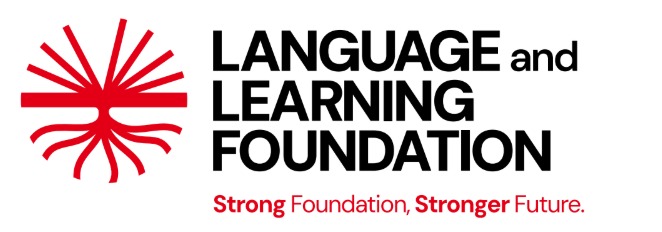Conferences & Events

Mobilising knowledge, partnerships, and innovations for sustainable development through education and training.
Language and Learning Foundation (LLF) was at UKFIET2025, joining global experts to explore how evidence, equity and innovation can transform foundational learning in resource-constrained contexts.
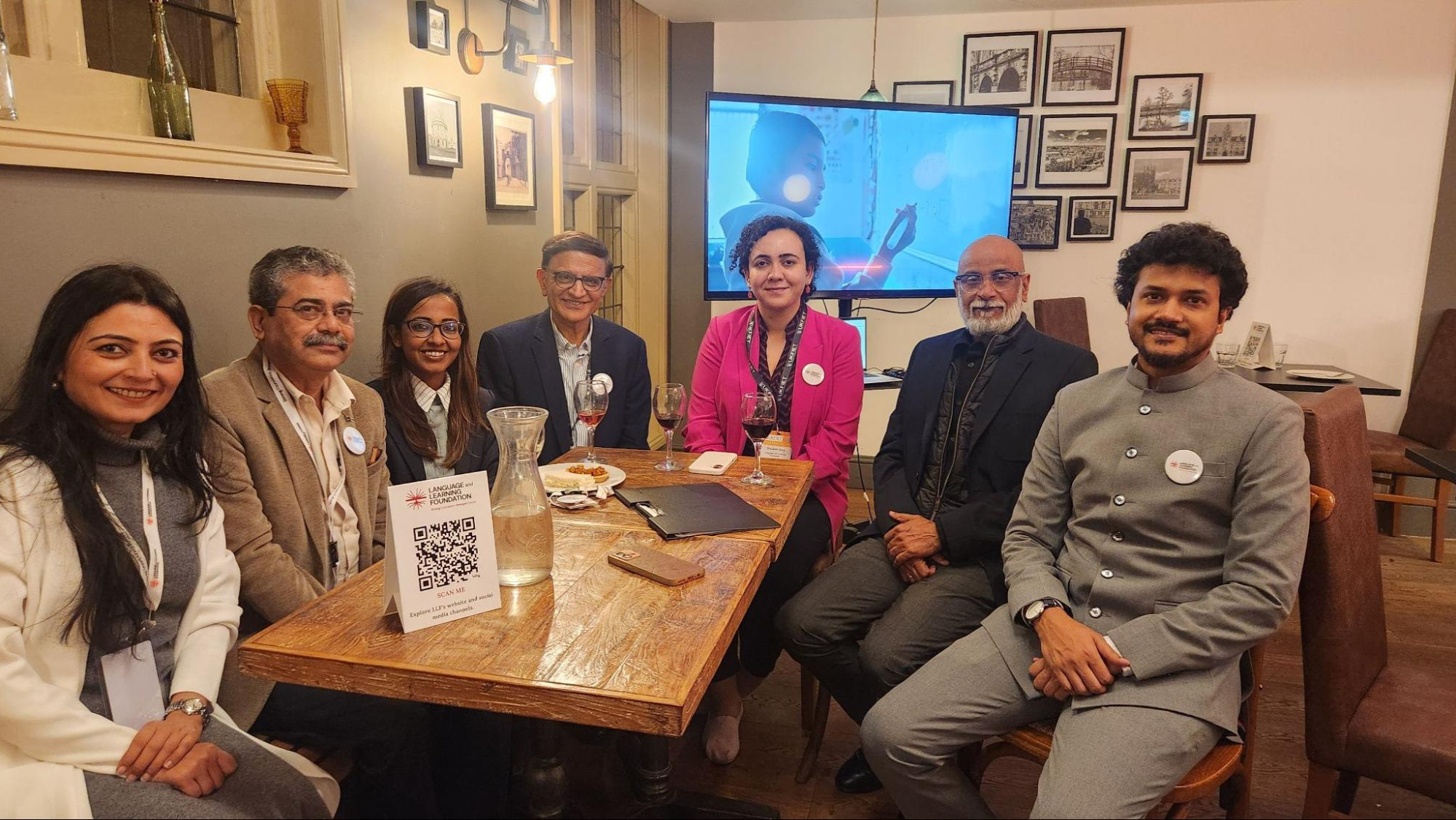
Key Sessions
Panel:
- Funding the Future: How Outcome-Based Financing Can Strengthen Education Systems | Date: 16 September 2025 | Time: 11:30 AM – 1:00 PM
Panel:
Achieving Reading Skills that Prepare Children for Sustainable Futures: What Does Evidence-Aligned Reading Instruction Tell Us? | Date: 16 September 2025 | Time: 4:00 PM – 5:30 PM
Workshop:
Invisible Backpacks: Understanding and Addressing Intersectional Barriers to Learning in Foundational Years | Date: 17 September 2025 | Time: 1:30 PM – 3:00 PM
Panel: Funding the Future: How Outcome-Based Financing Can Strengthen Education Systems
Funding the Future: How Outcome-Based Financing Can Strengthen Education Systems
Chair: Dhir Jhingran (Language and Learning Foundation)
Panellists: Shivakshi Rana (Language and Learning Foundation), Shraddha Iyer (British Asian Trust), Dia Banerjee (Dalberg), Paul Wafer (The Education Outcomes Fund), Moira Faul (NORRAG, Geneva Graduate Institute)
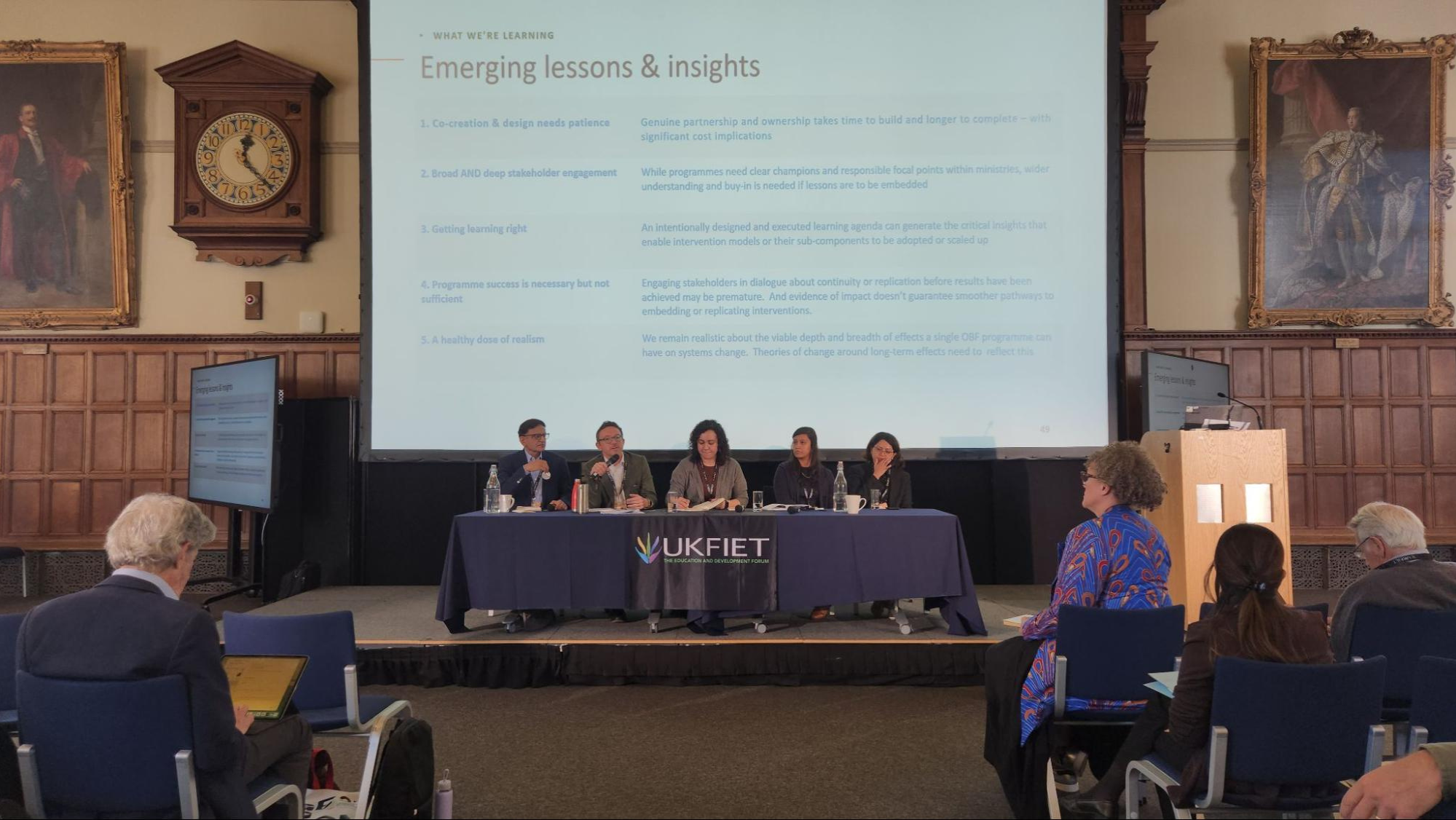
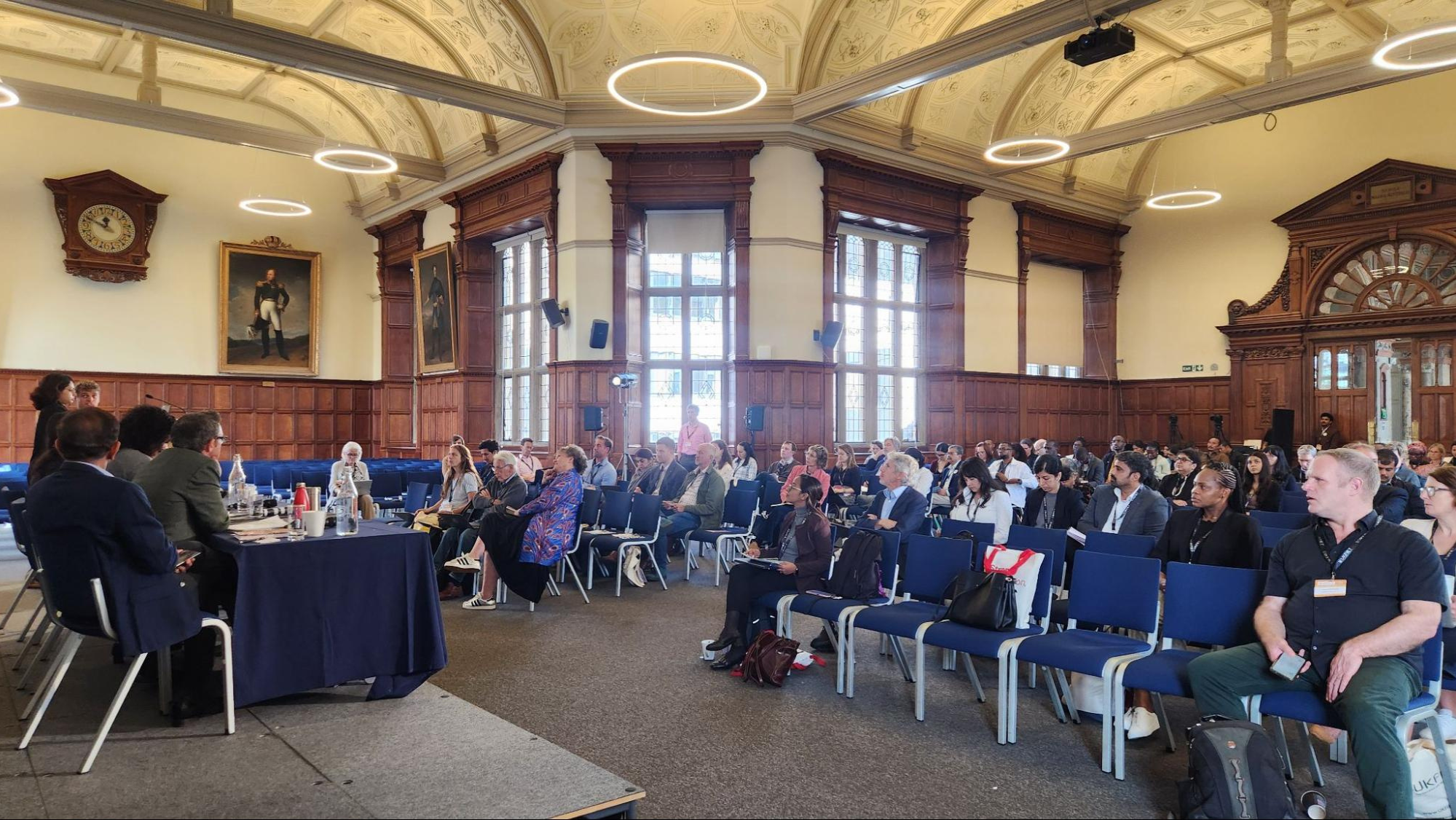
Drawing on experiences from India and Nigeria, panellists highlighted evidence of cost efficiency, flexibility for innovation, and data-driven decision making, alongside challenges such as regional disparities and implementation bottlenecks.
We were overwhelmed with the audience response at our panel, with over 110 participants engaged in reflective discussions on how OBF can both enable stronger learning outcomes and system strengthening, while also raising important questions on sustainability, equity, and government ownership.
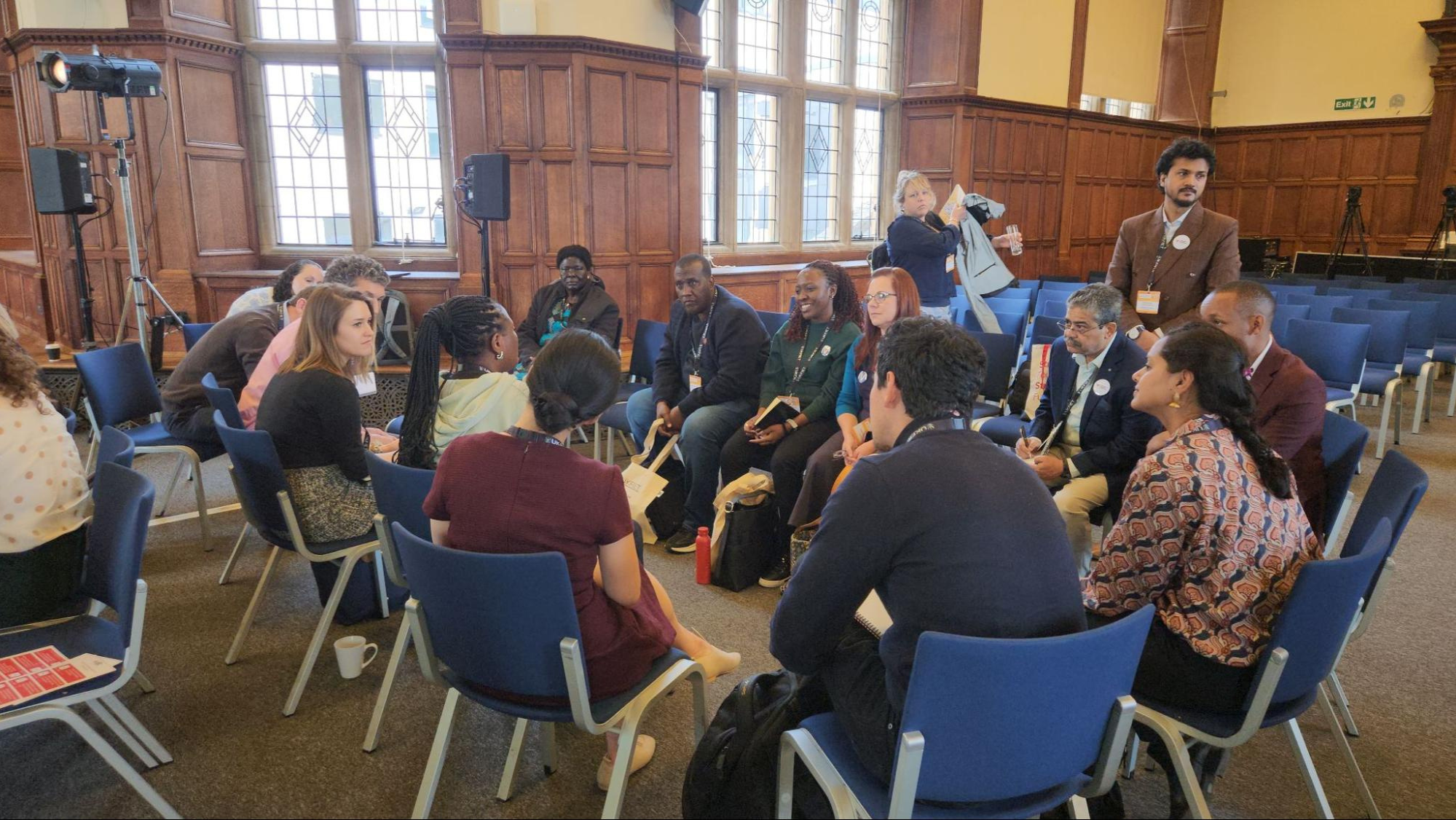
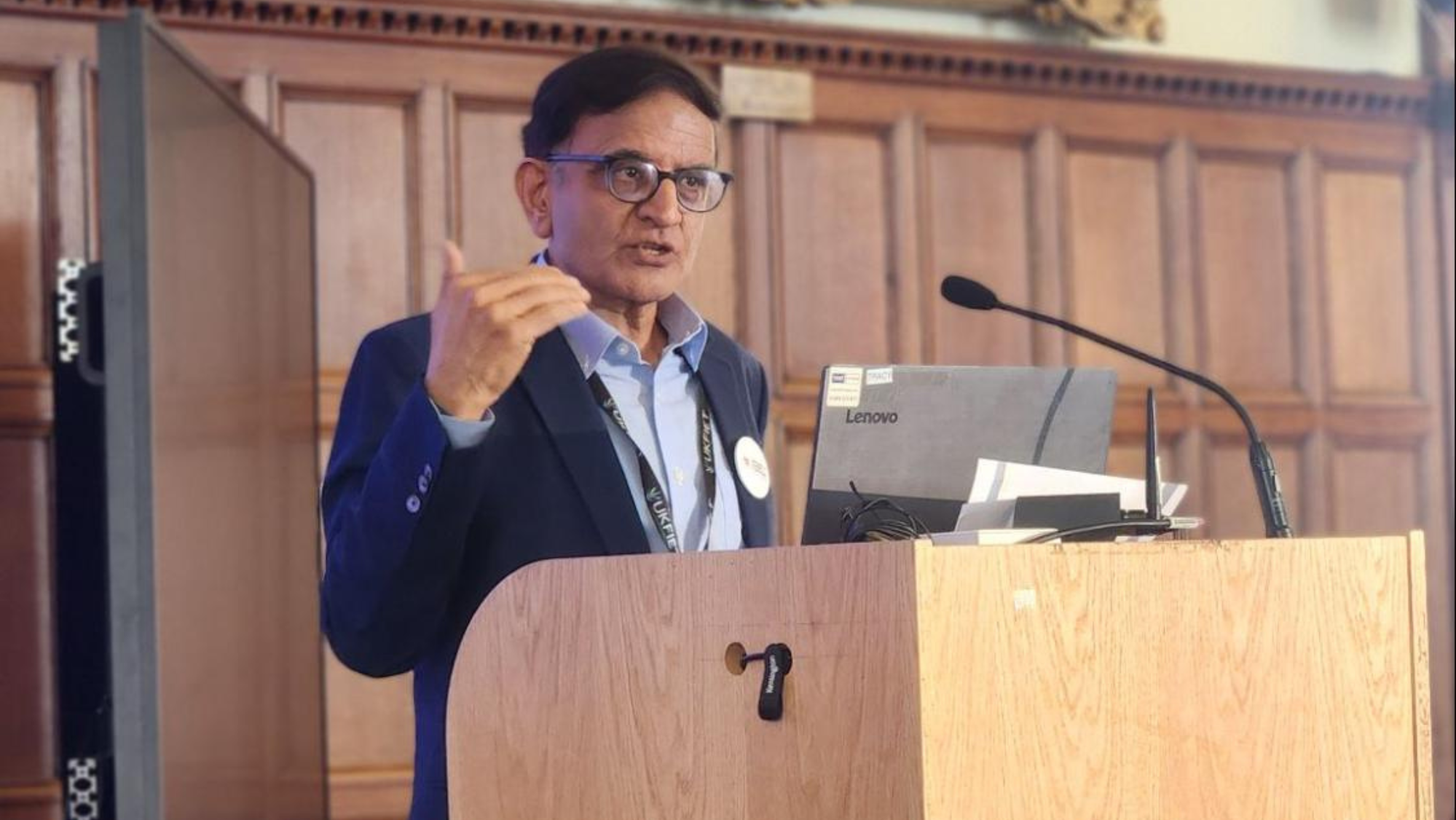
The panel concluded that OBF is most effective when codesigned with government, aligned with systemic priorities, and evaluated beyond short-term learning outcomes to ensure long-term system strengthening.
Panel: Achieving Reading Skills that Prepare Children for Sustainable Futures: What Does Evidence-Aligned Reading Instruction Tell Us?
Achieving Reading Skills that Prepare Children for Sustainable Futures: What Does Evidence-Aligned Reading Instruction Tell Us?
Panellists: Dhir Jhingran (Language and Learning Foundation), Maria Brindlmayer (BE2 Secretariat and Global Education Evidence Advisory Panel (GEEAP) Secretariat), Margaret (Peggy) Dubeck (RTI International), Moses Ngware, (African Population and Health Research Centre), Benjamin Piper (Gates Foundation), Christopher Joseph Lack (The World Bank)
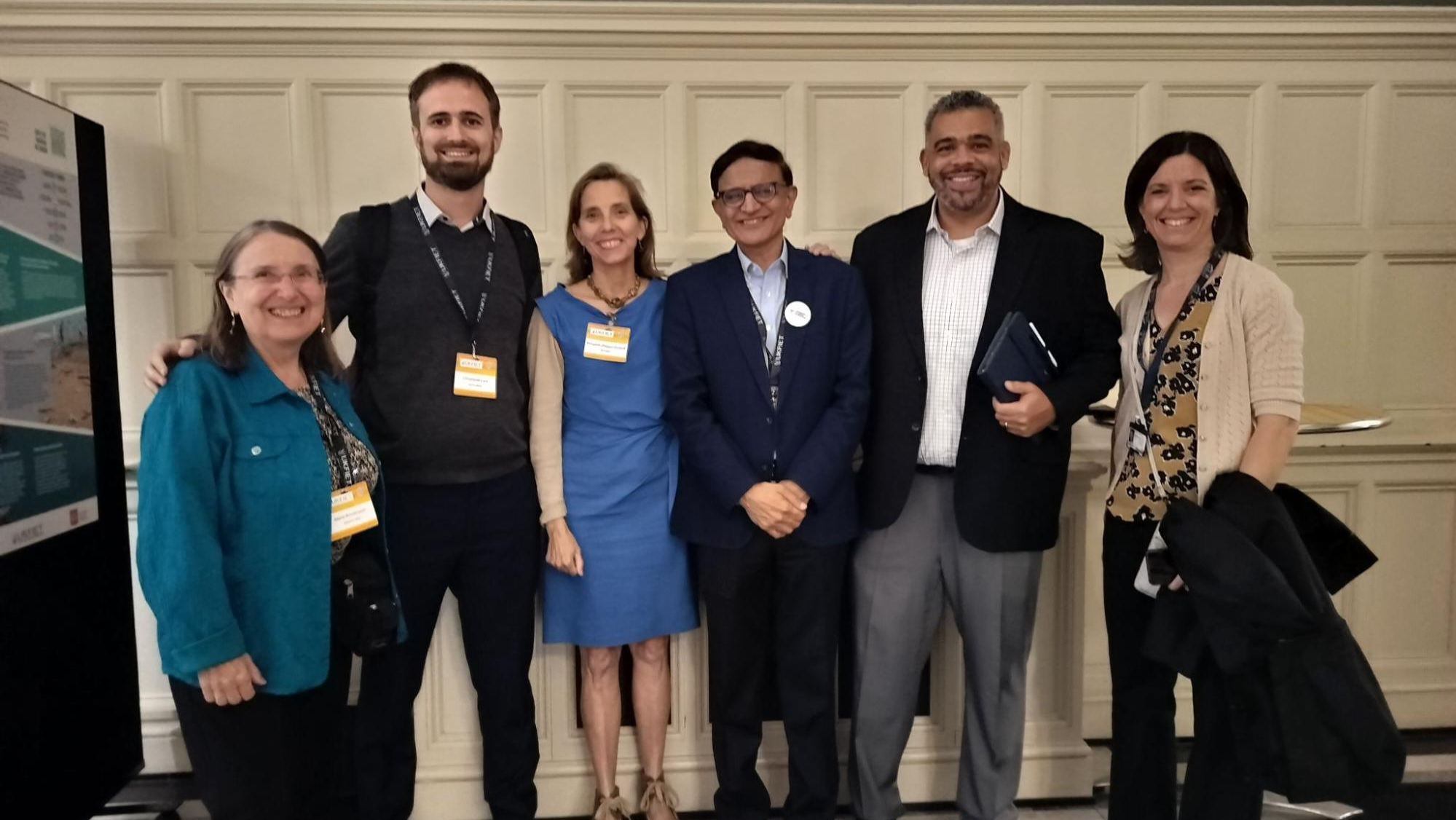
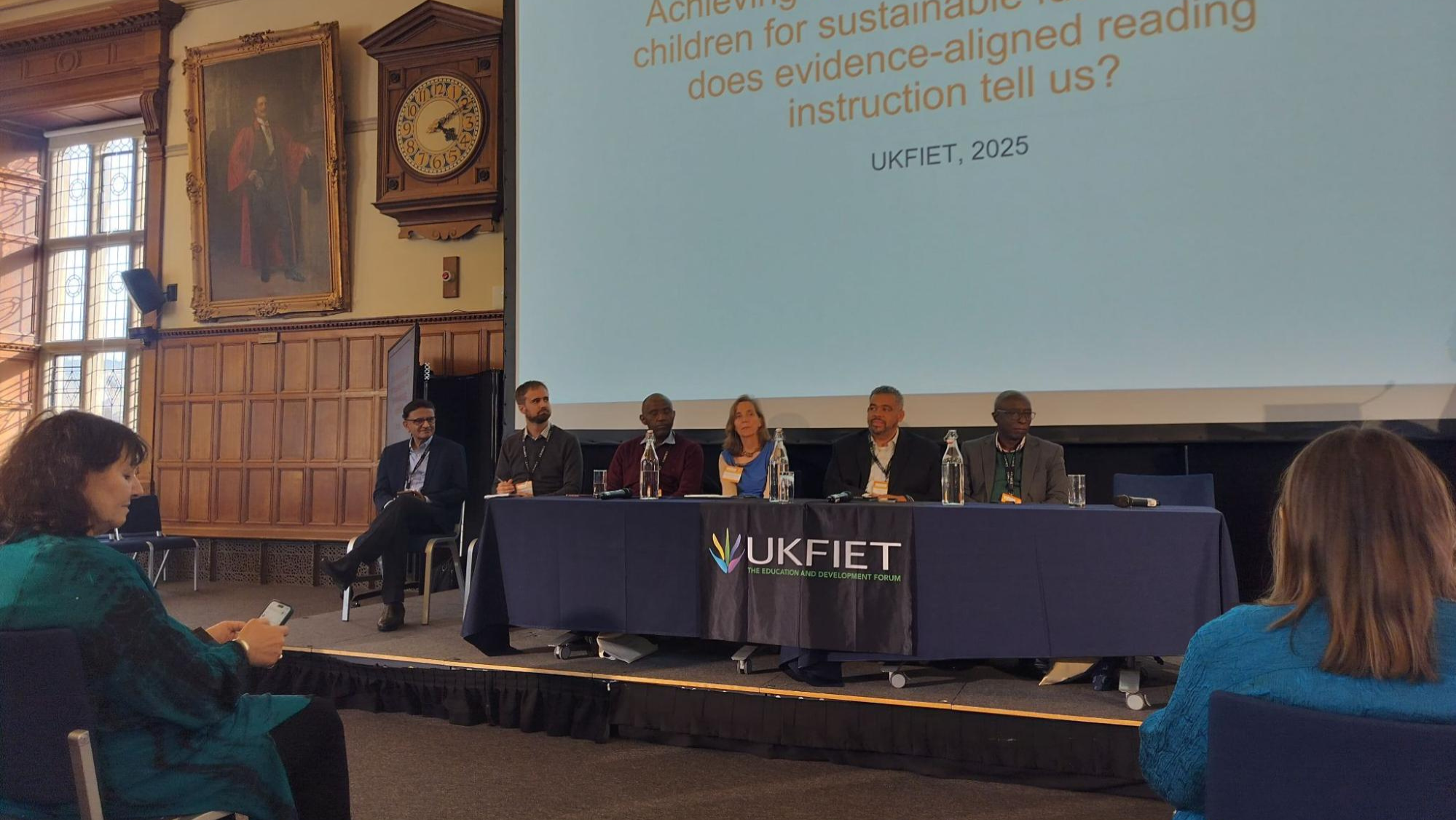
The session explored how early reading underpins lifelong learning and sustainable futures, and why many systems still struggle to put evidence into everyday classroom practice. Panellists highlighted that a large proportion of children in LMICs cannot yet read with understanding, and emphasised what helps: explicit, systematic and comprehensive instruction, oral-language development in familiar languages, and sufficient classroom time for guided and independent reading.
Practical teacher support was a recurring theme — from high-quality materials to mentoring and classroom-based professional development. Reflecting on system-level realities, Dhir Jhingran (Language and Learning Foundation) noted: “The quality of implementation is really crucial for effective practices to take root… teacher professional development needs more demonstration and practice, which can bring change in classrooms.”
Workshop: Invisible Backpacks: Understanding and Addressing Intersectional Barriers to Learning in Foundational Years
Invisible Backpacks: Understanding and Addressing Intersectional Barriers to Learning in Foundational Years
Moderators: Shivakshi Rana (Language and Learning Foundation), Dhir Jhingran (Language and Learning Foundation), Prof. Dan Wagner (University of Pennsylvania)
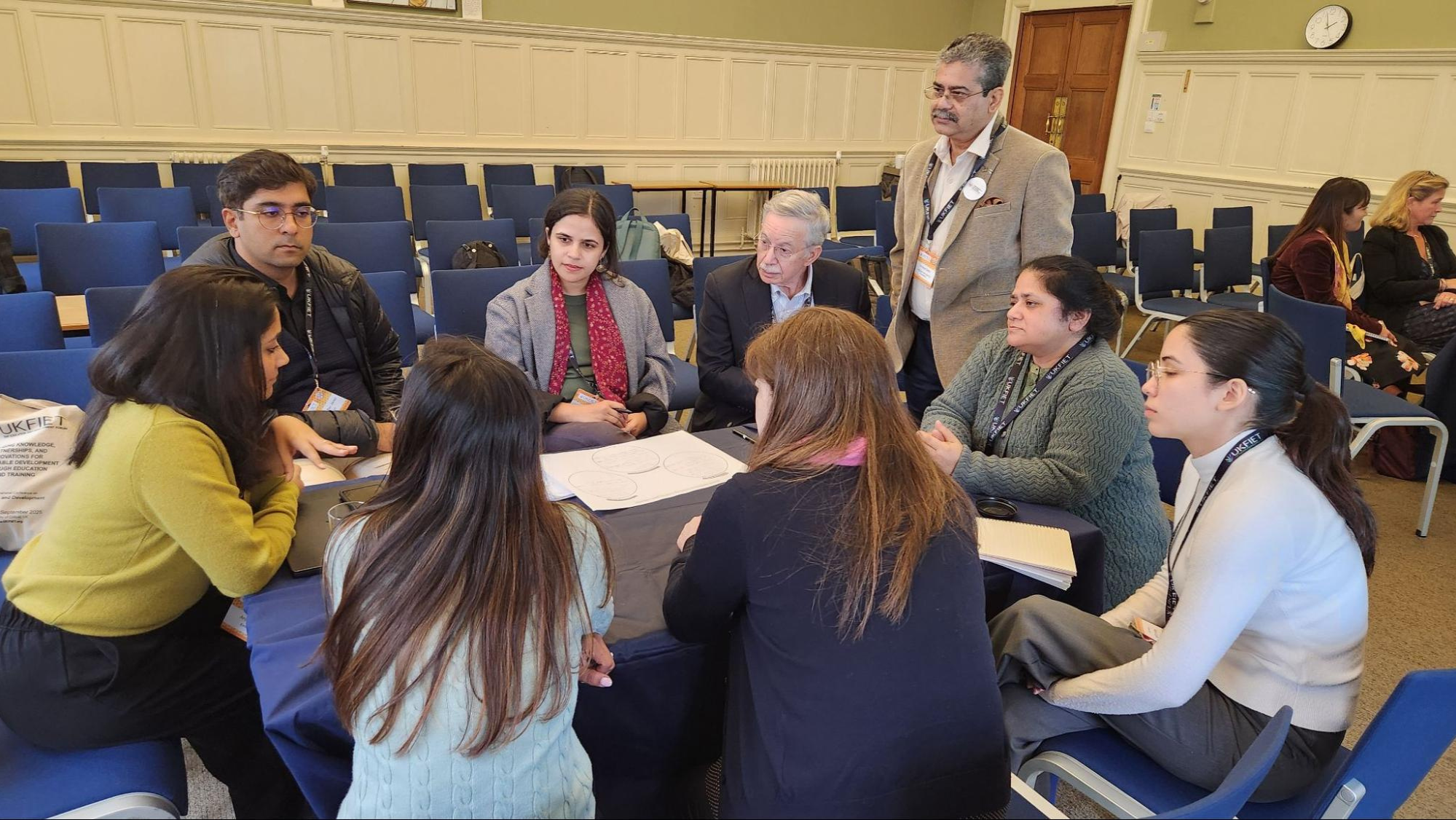
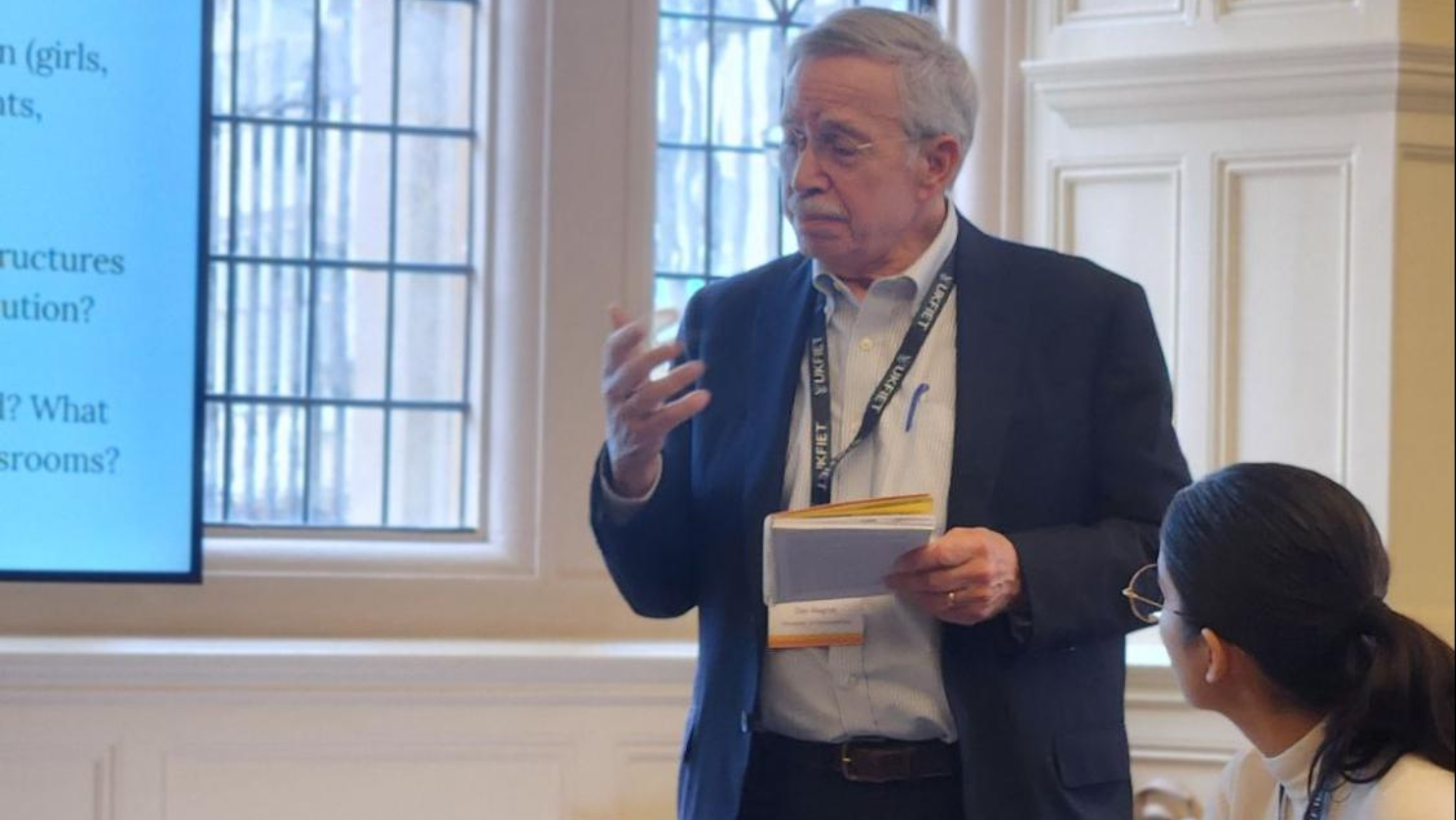
Behind every learning statistic, there are stories of children carrying burdens we do not always see. These “invisible backpacks,” shaped by poverty, language, caste, gender, and home responsibilities, influence whether children achieve foundational literacy and numeracy.
LLF brought together voices from research and practice to unpack how intersectional barriers affect learning in the early years, and what we can do about them.
We began with the idea of “invisible backpacks” – the hidden barriers that children carry into classrooms. Participants shared powerful insights on how socioeconomic background, systemic barriers, culture, and identity intersect to create obstacles in children’s learning journeys. At the same time, the discussion highlighted that there are also visible barriers, and both must be recognised if all children are to thrive.
The workshop was guided by two key questions: What are the invisible barriers for policymakers? What are the invisible barriers for teachers? The third part of the session was to see how all of these different barriers intersect. And what do these intersectional barriers look like when it comes to children’s learning needs?
Key insights led by Dr Dan Wagner included:
– Understanding the complex background factors shaping learner experiences
– Placing marginalised learners at the centre of educational interventions
– Supporting teachers to build inclusive classrooms

Envisioning Education in a Digital Society
LLF was at CIES 2025, joining experts from across the globe to explore multilingual
education, large-scale system change, and strategies for improving foundational
learning in resource-constrained contexts.
LLF organised key panels and lead critical discussions alongside researchers,
policymakers, and practitioners to examine what works and what doesn’t, in
strengthening education systems.
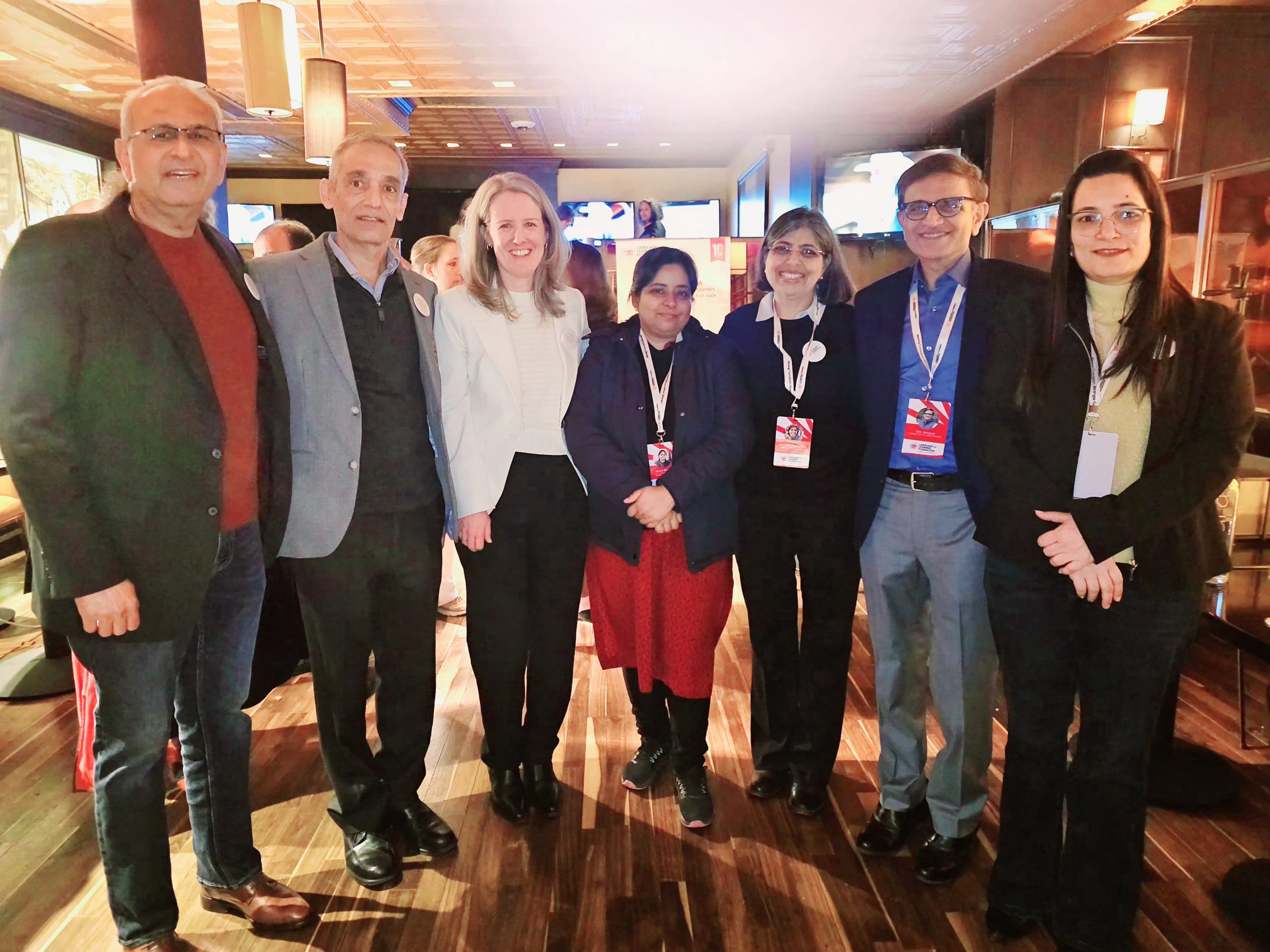
Key Panel Discussions
- Rethinking Multilingual Education in South Asia – What works, and what does not?
- Implementation Science? Decoding the complexity of system change in large-scale
government-nonprofit collaborations
- Leading from the Middle – The role of the middle tier in improving foundational
learning
- Shifting Systems – Contextualized strategies for improving foundational learning
Panel on 23 MARCH 2025
23 March 2025
LLF organised the panel discussion on Rethinking Multilingual Education in South Asia – What Works? And What Doesn’t? sparking a thought-provoking discussion on the challenges and possibilities of multilingual classrooms.
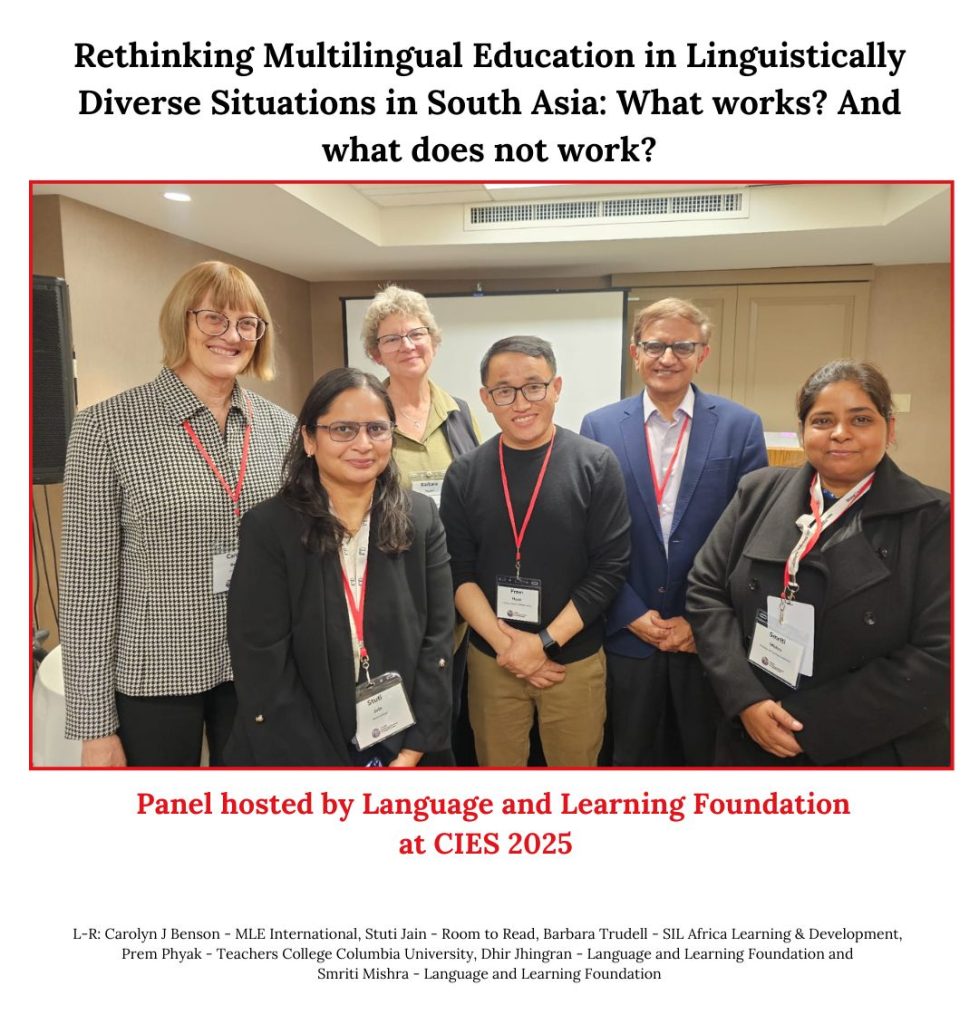
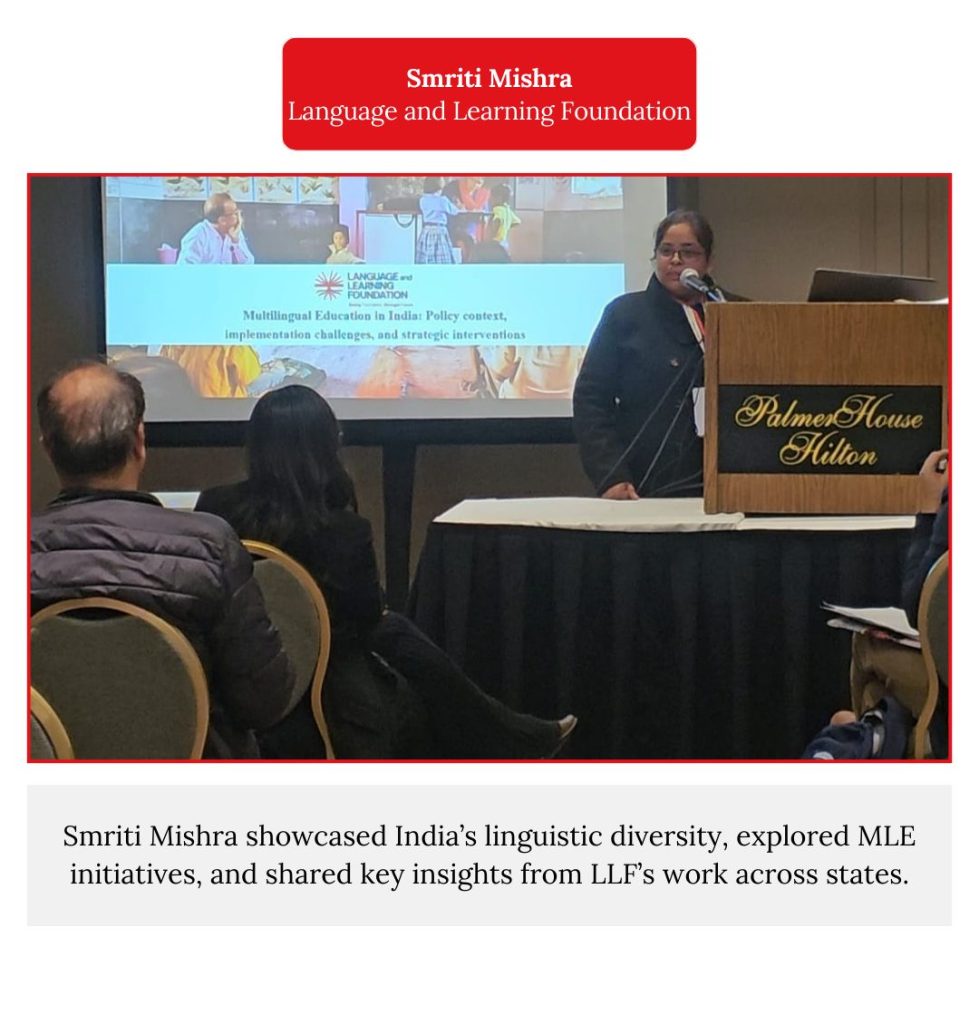
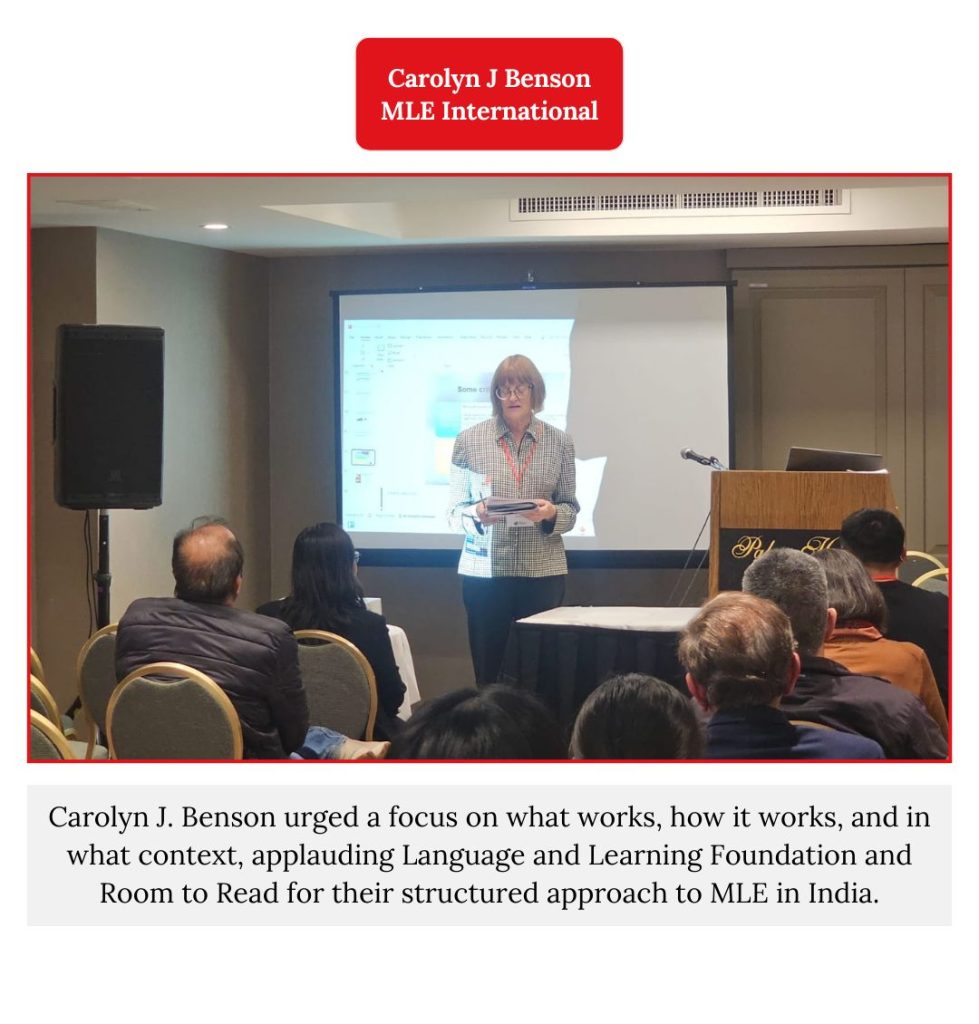
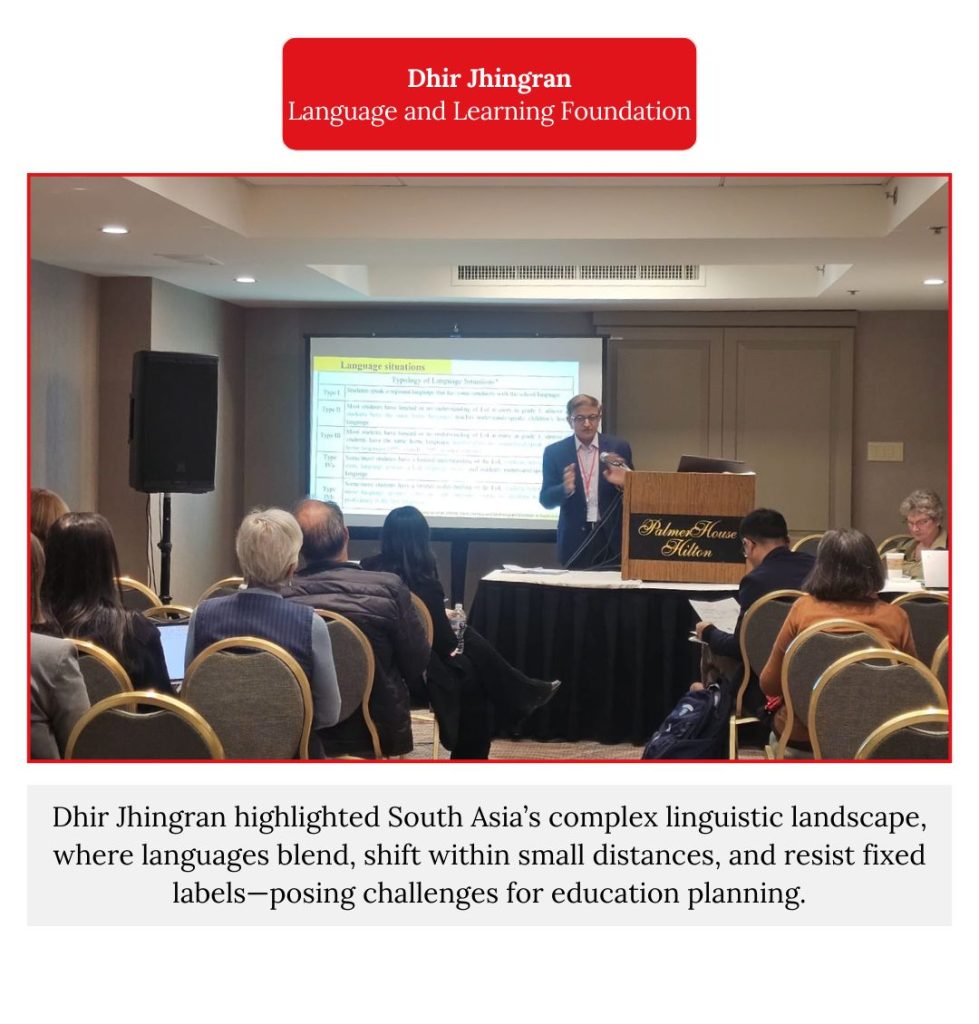
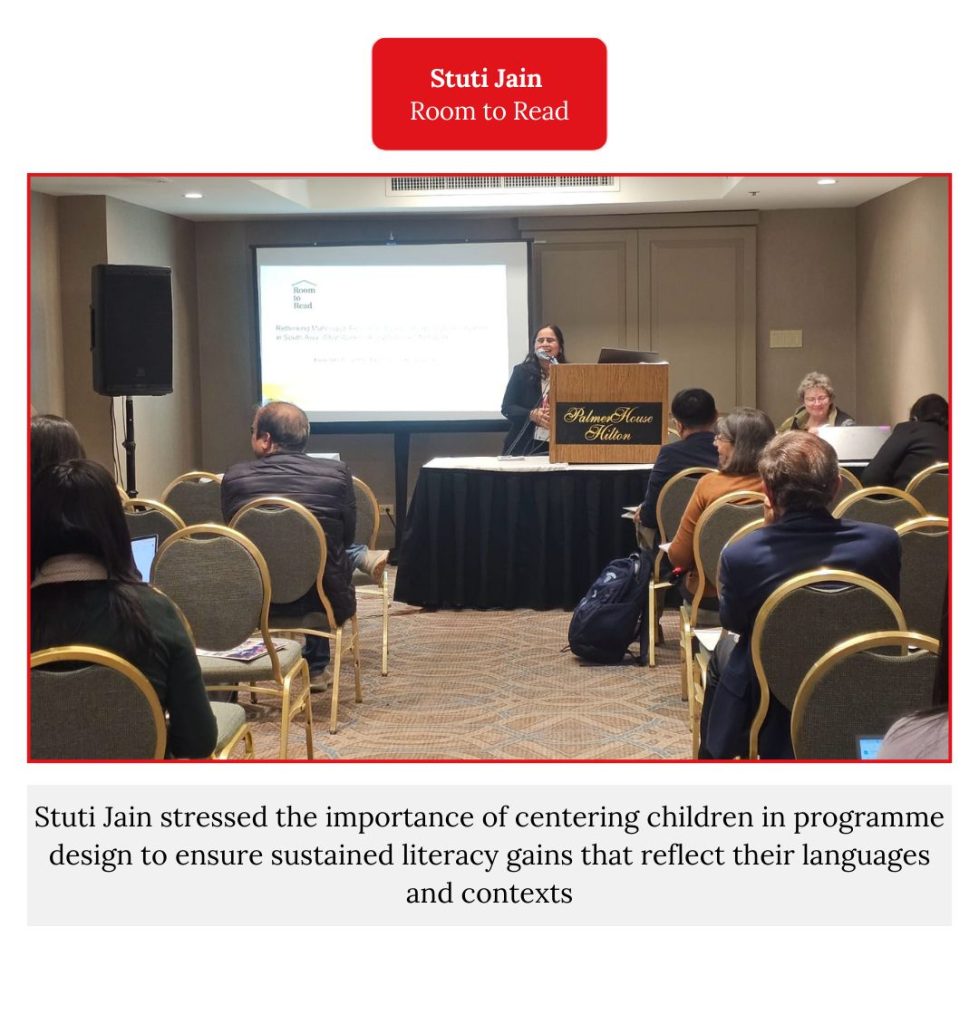
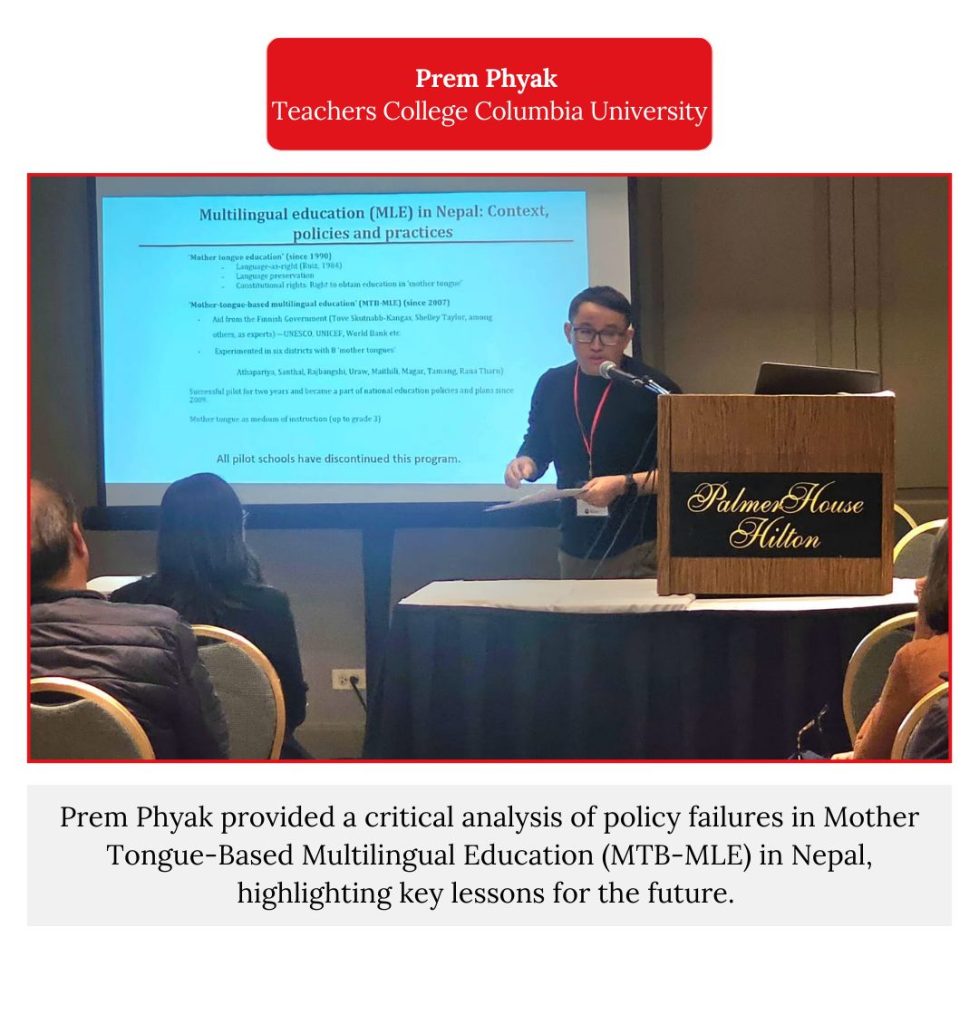
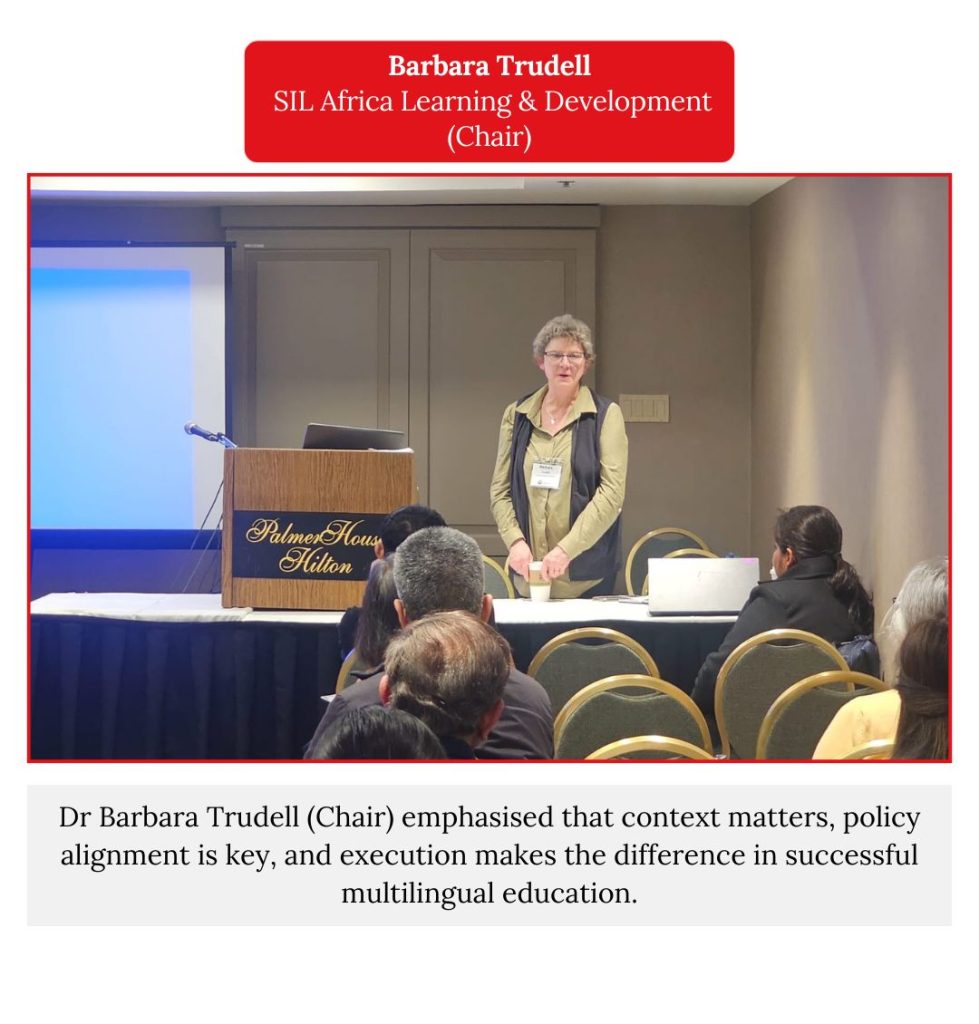
The discussion reaffirmed the need for multilingual education policies that are deeply contextual, effectively implemented, and aligned with the linguistic realities of learners, while also highlighting both the challenges and opportunities in ensuring inclusive and equitable learning through a powerful exchange of ideas.
Panel on 24 MARCH 2025
24 March 2025
LLF organised a session on Implementation Science? Decoding the complexity of system change in large-scale government-nonprofit collaborations. Chaired by Benjamin Piper, Gates Foundation, the session highlighted key lessons from India’s education reform journey.
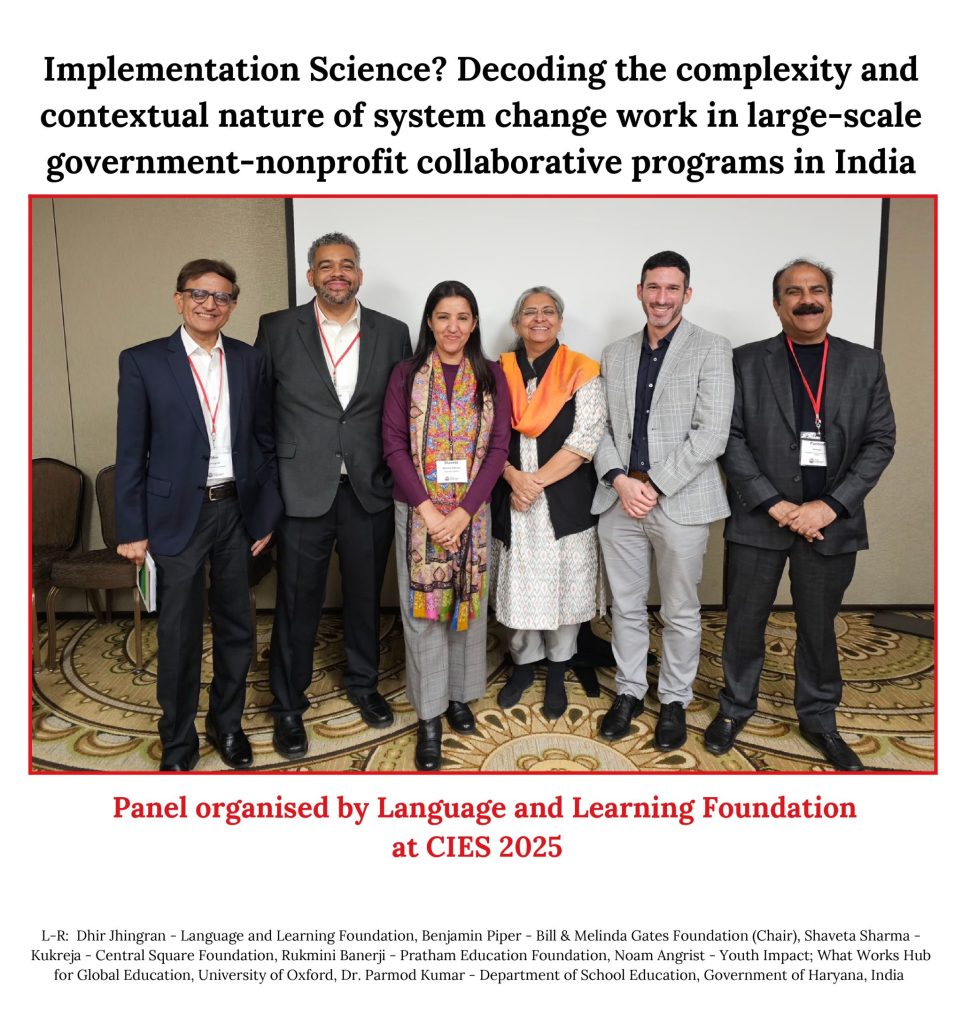
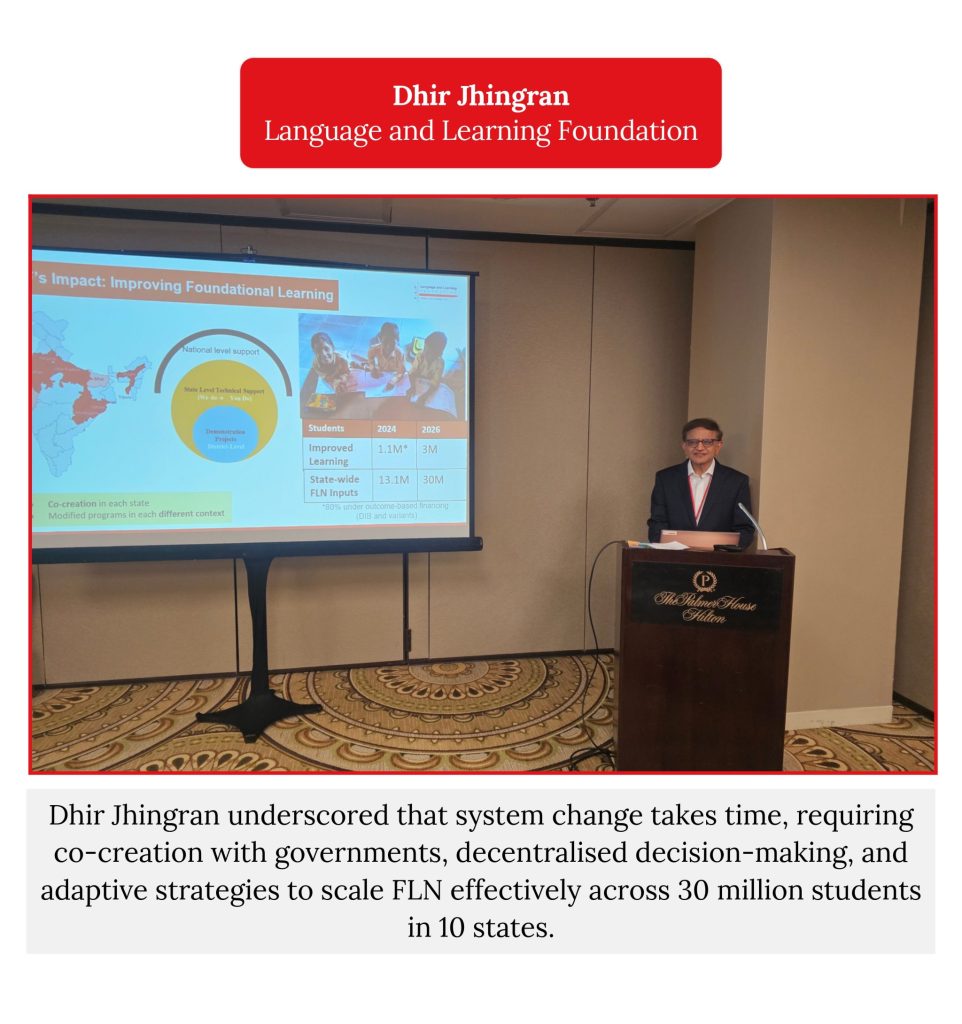
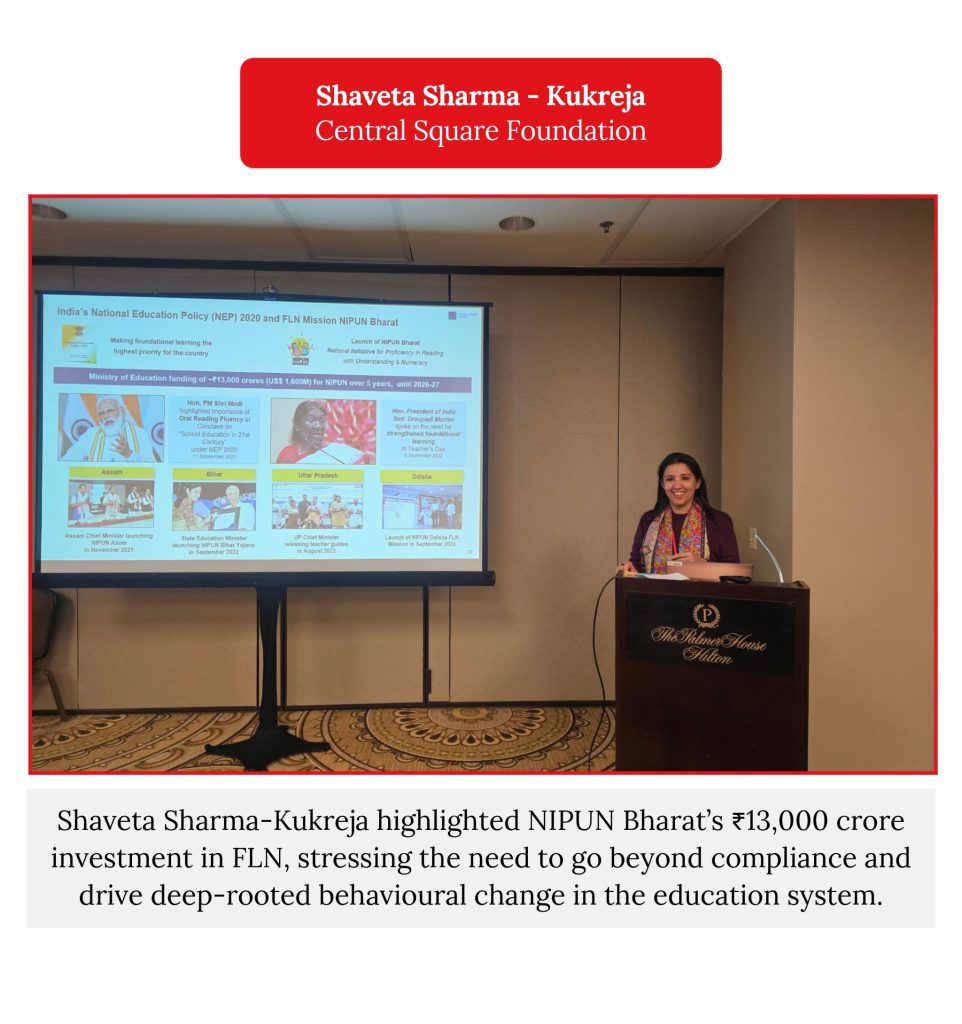
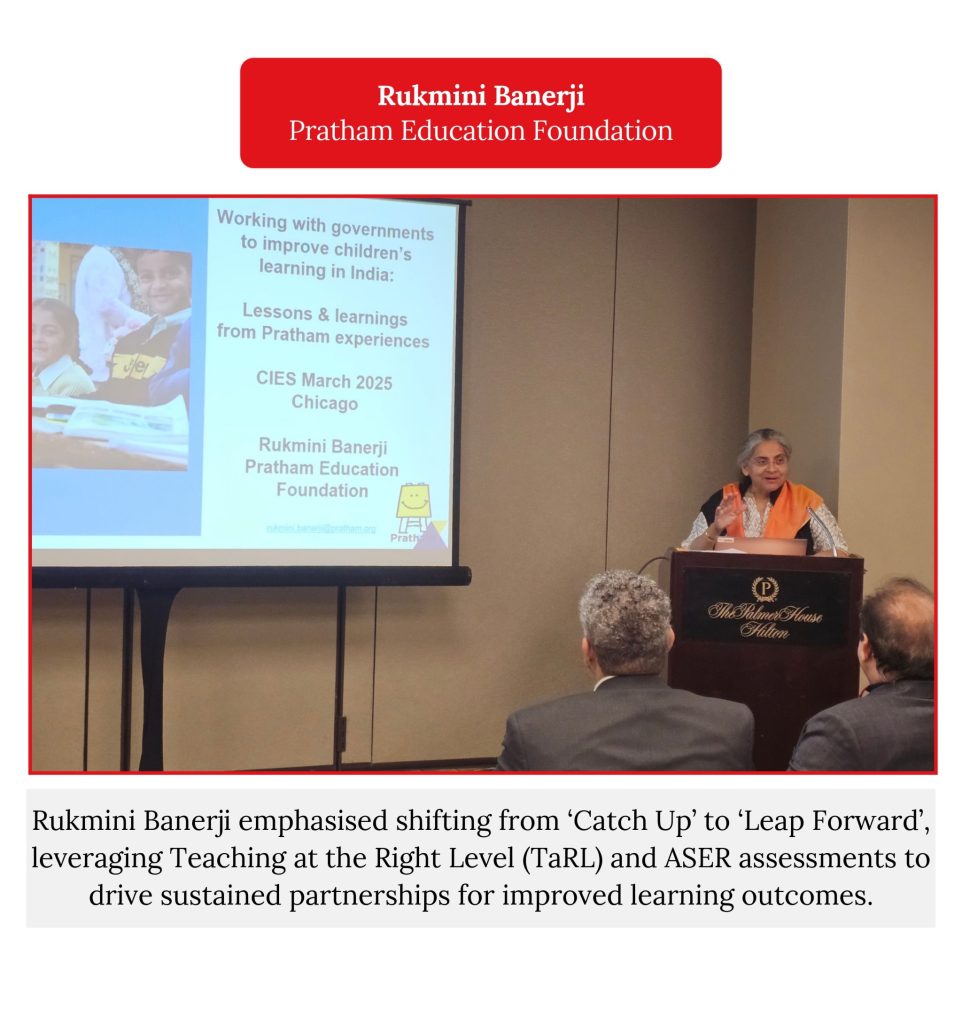
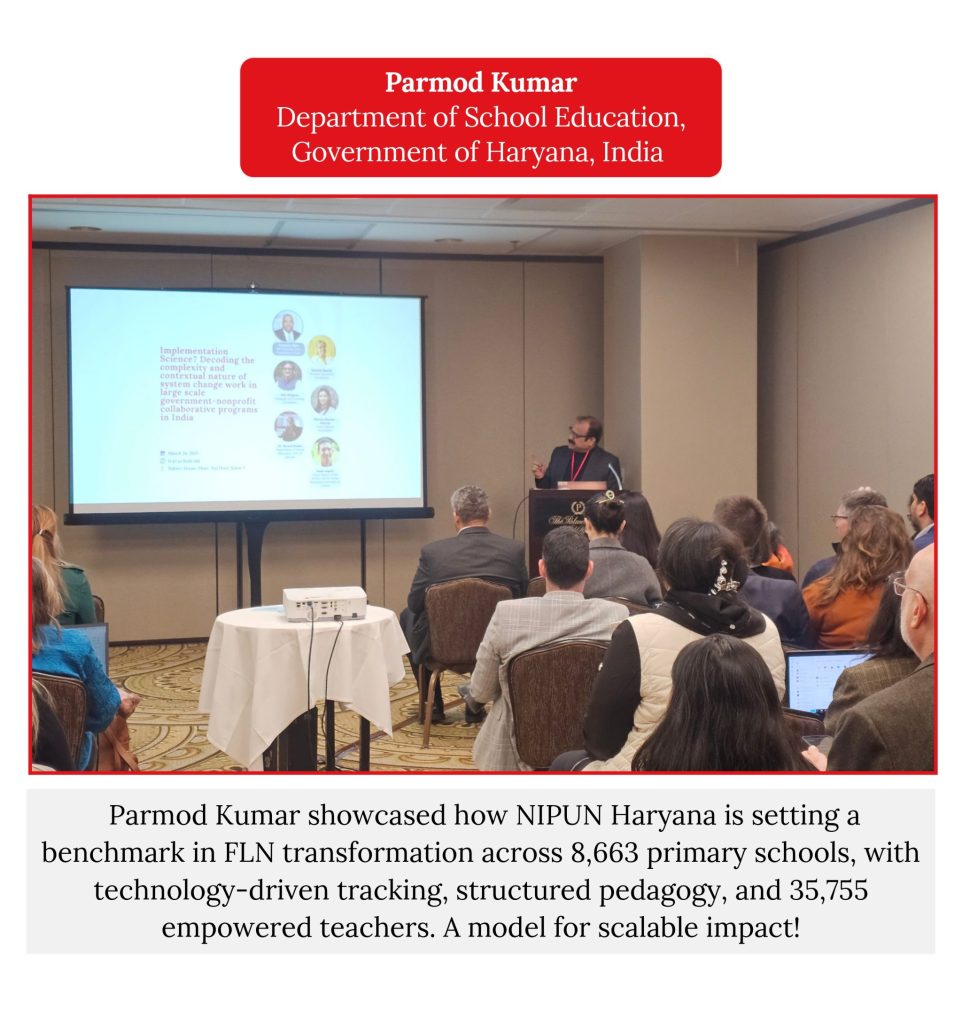
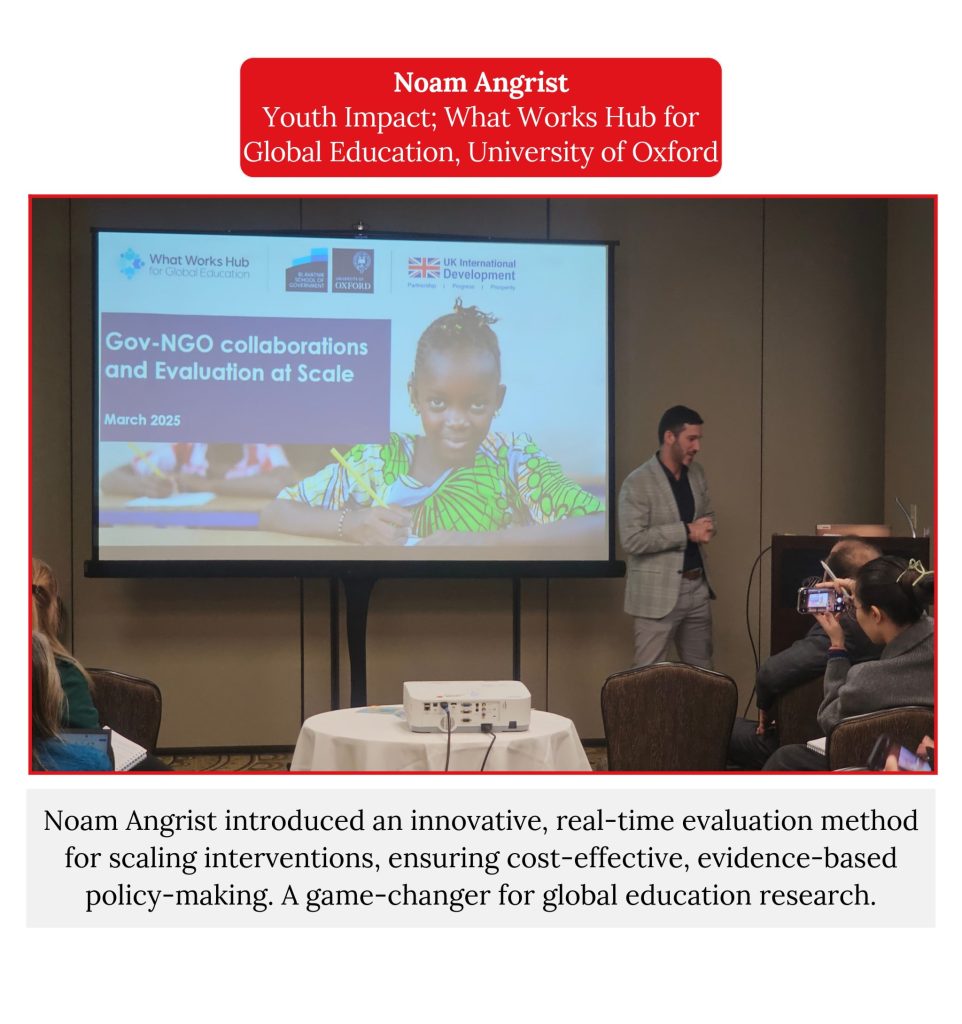
The session reinforced that scaling education reform isn’t just about expansion—it’s about sustained, adaptive, and data-driven implementation. India’s FLN journey is setting the stage for systemic transformation at scale.
Panel on 25 MARCH 2025
25 March 2025
In a panel discussion titled Leading from the Middle: New Evidence on Strengthening the Middle Tier for Foundational Learning, experts discussed the critical role of the middle tier in improving foundational learning outcomes. Chaired by Joseph DeStefano, RTI International, the session explored insights from India, Ghana, and Rwanda on how strengthening district and sub-district leadership can drive systemic education reform.
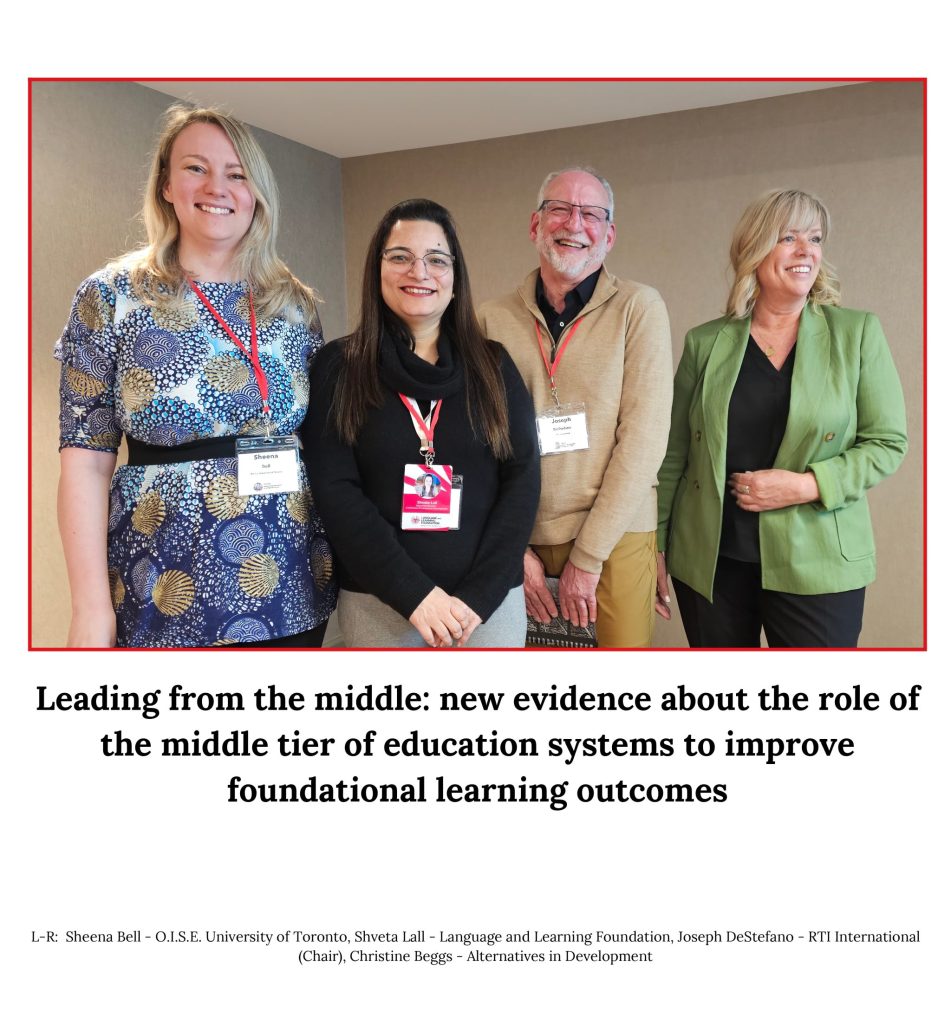
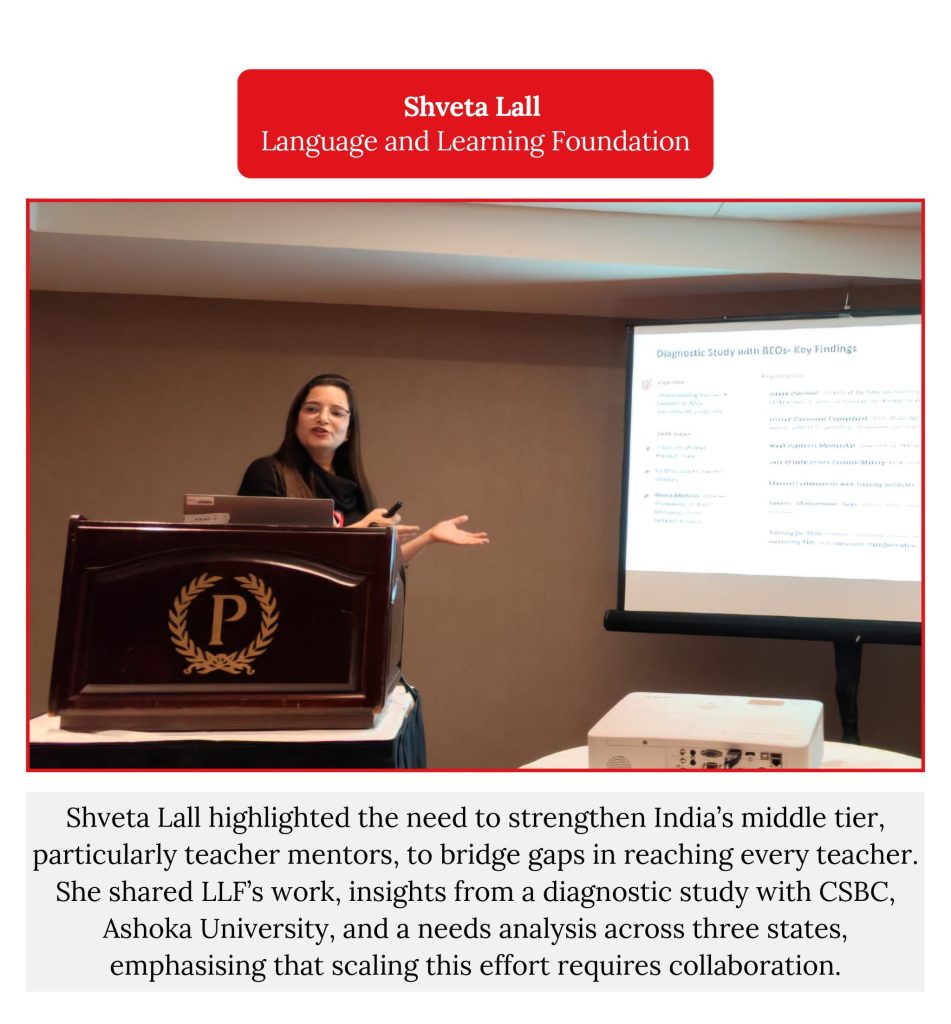
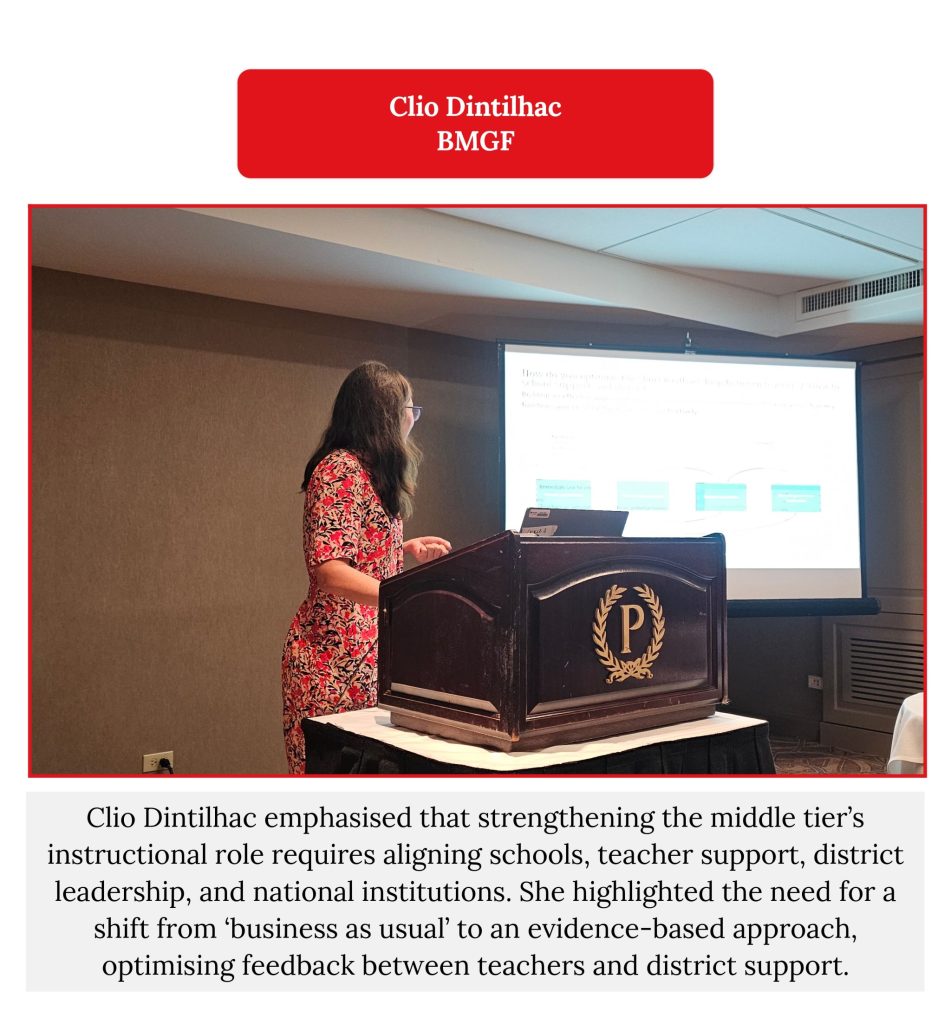
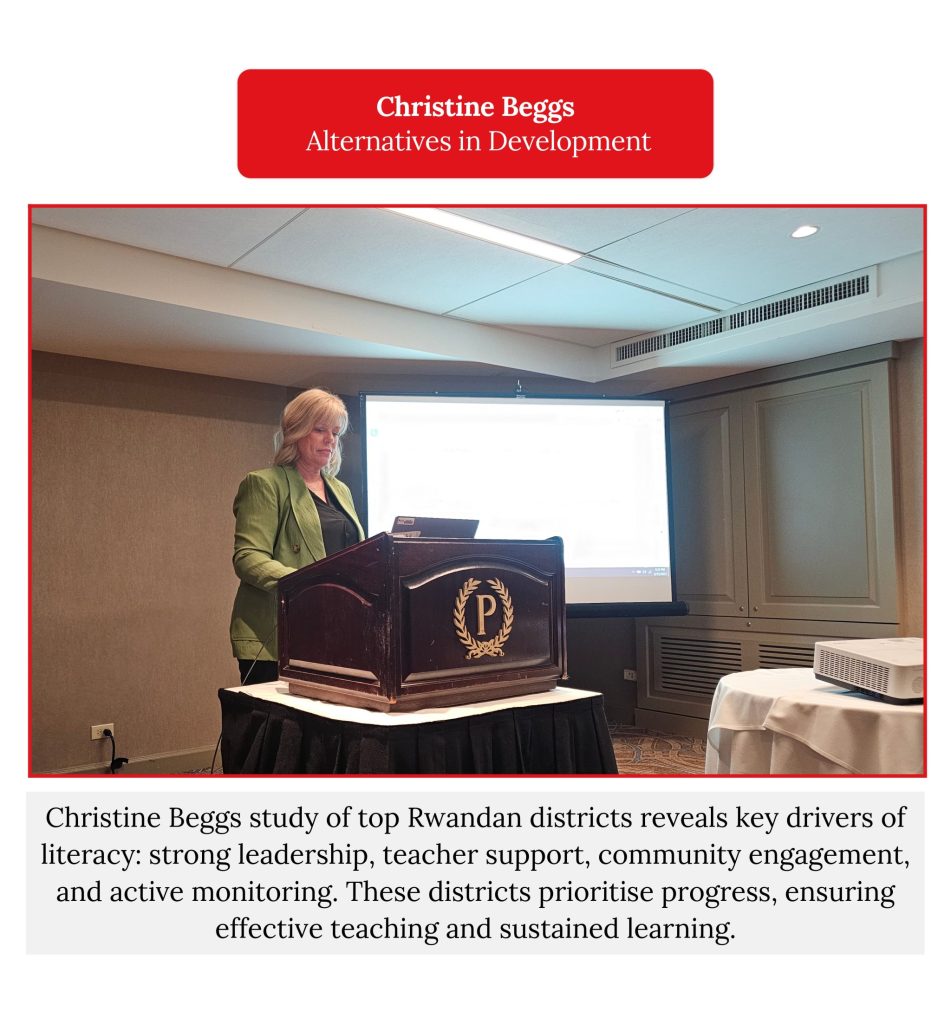
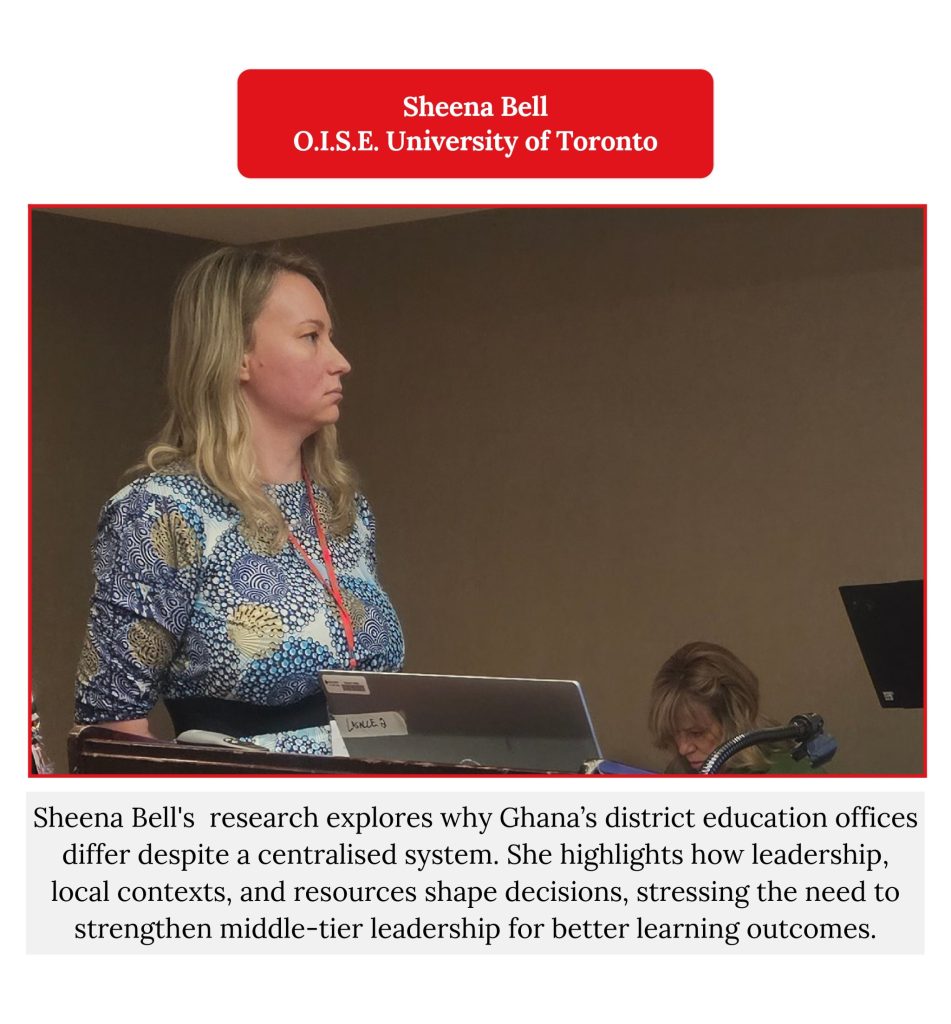
The panel discussion reinforced that investing in middle-tier leadership is key to lasting education reform. Strengthening district- and block-level structures ensures that teaching and learning improvements reach every classroom, making large-scale impact possible.
Panel on 26 MARCH 2025
26 March 2025
LLF organised a panel discussion on Shifting Systems: Comprehensive and Contextualised Strategies for Improving Foundational Learning in India. Chaired by Dr Asiya Kazmi, OBE, Gates Foundation, the session brought together key voices to discuss government-NGO collaboration, structured pedagogy, multilingual education, and systemic teacher support as pathways to driving sustainable education reform. The experts on the panel examined scalable, system-driven strategies to improve Foundational Literacy and Numeracy (FLN) in India.
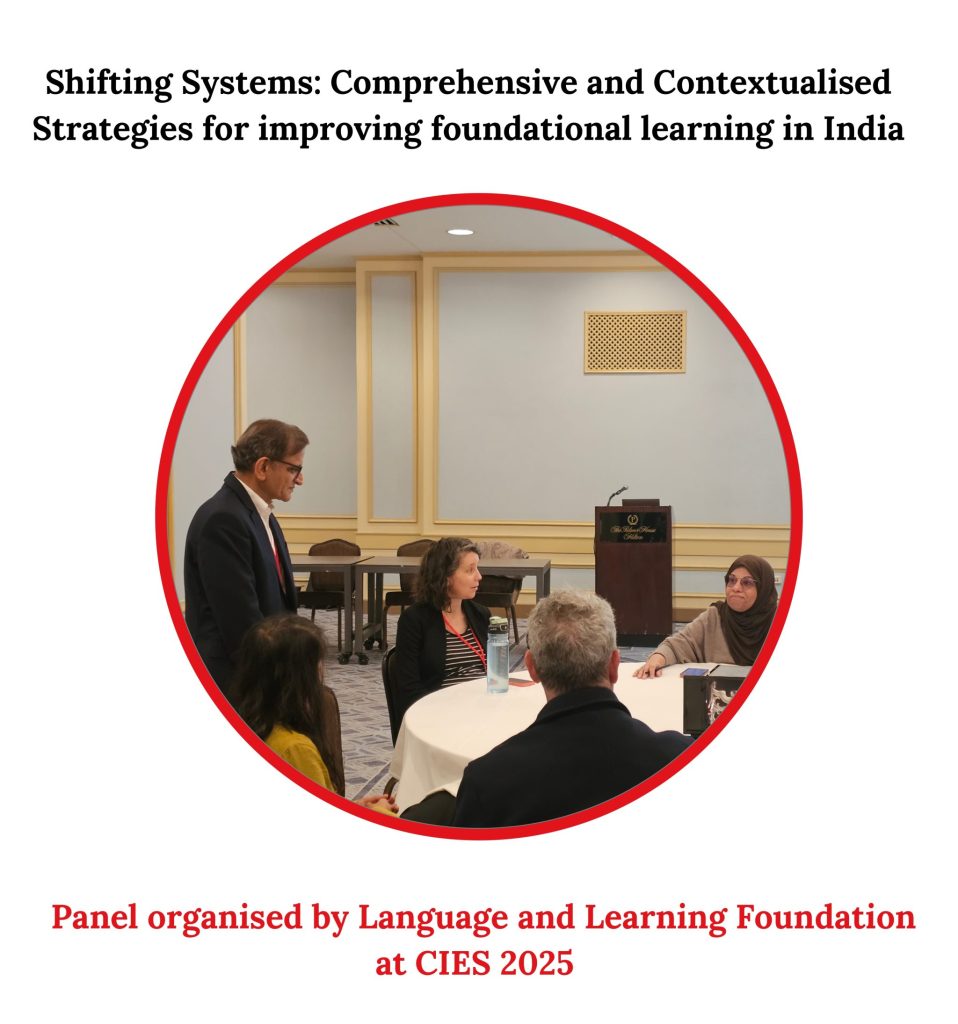
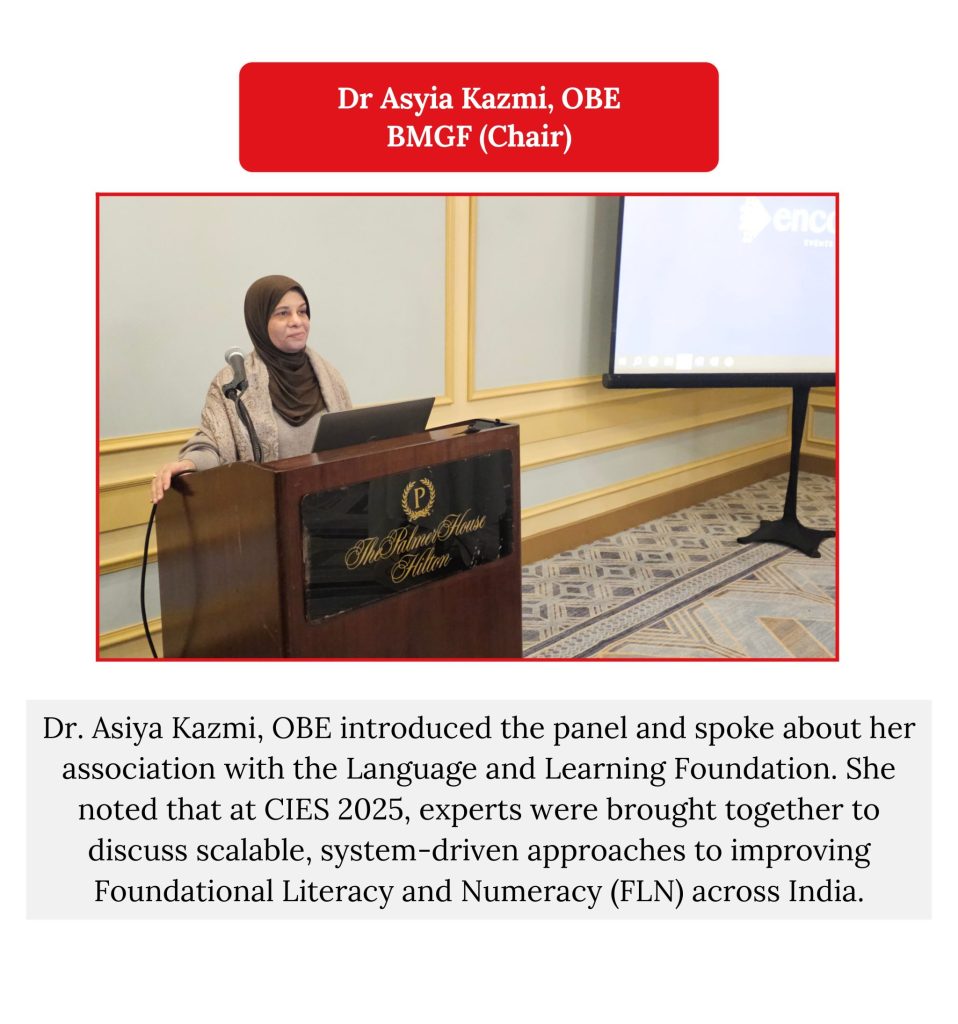
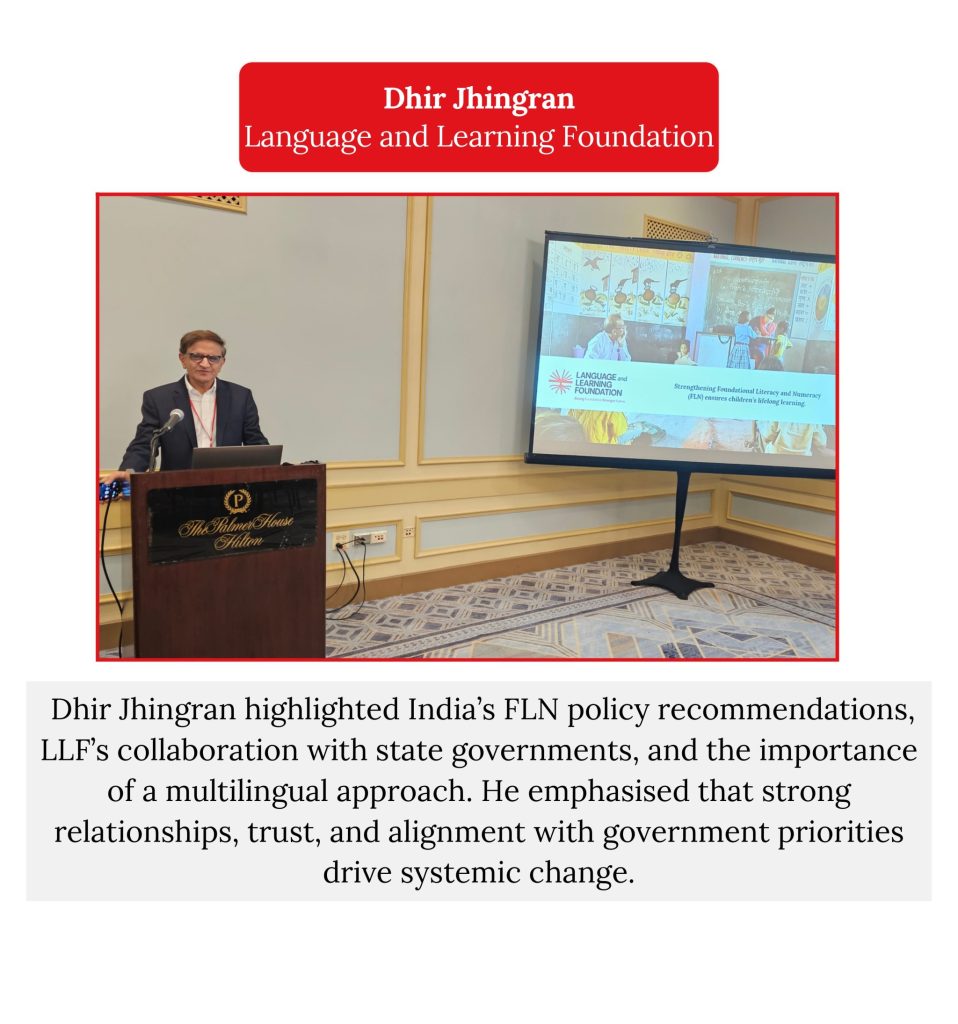
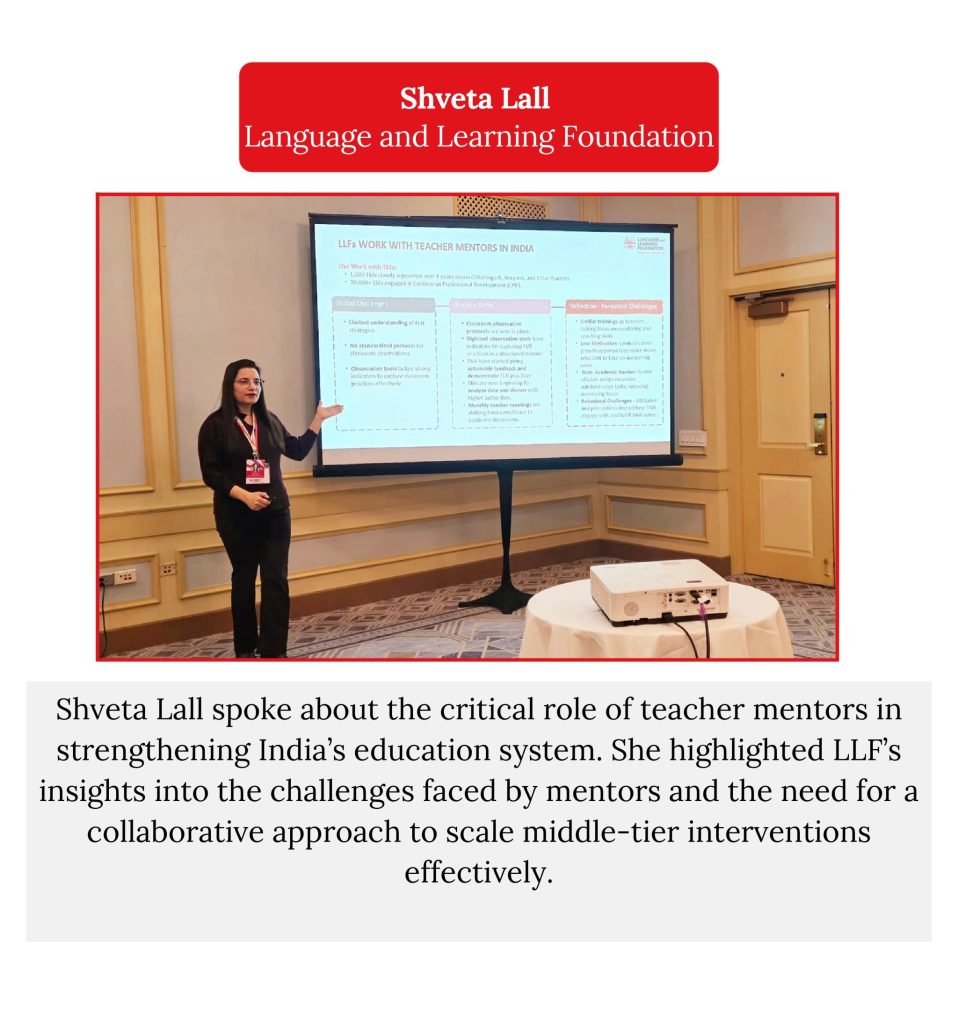
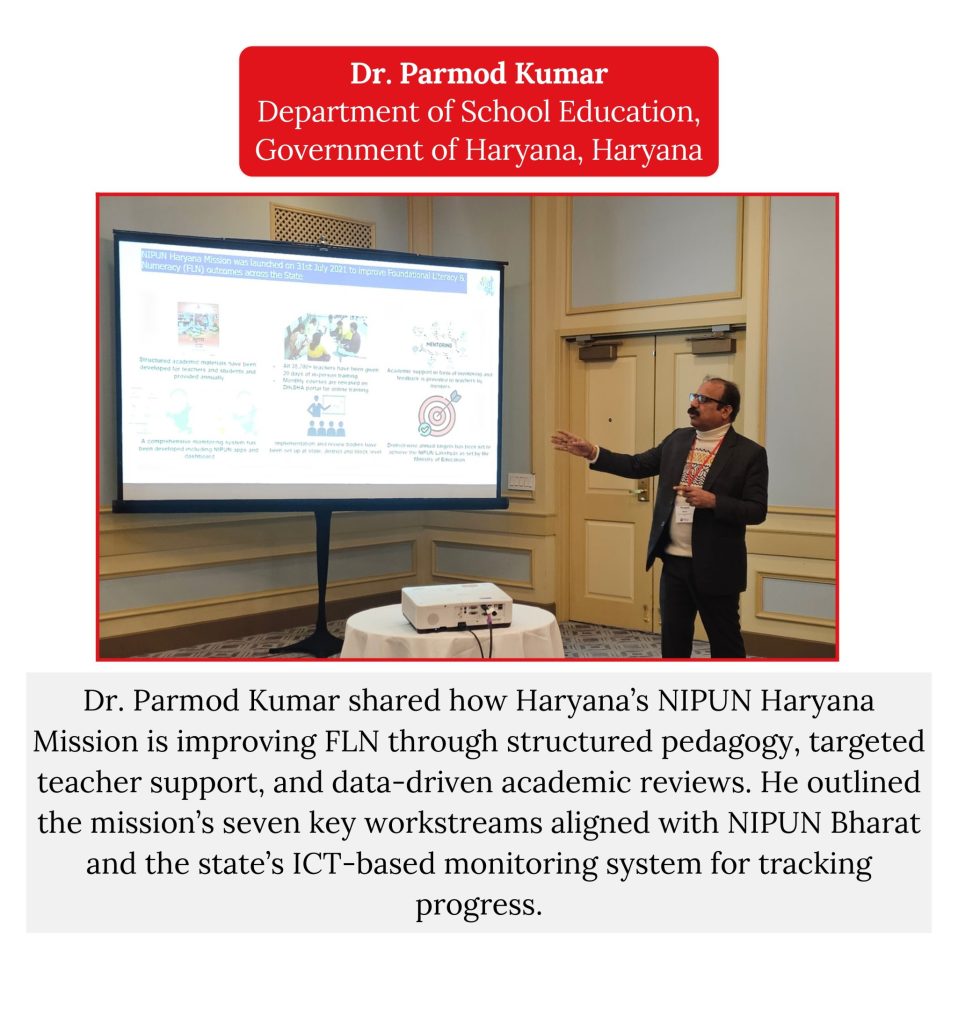
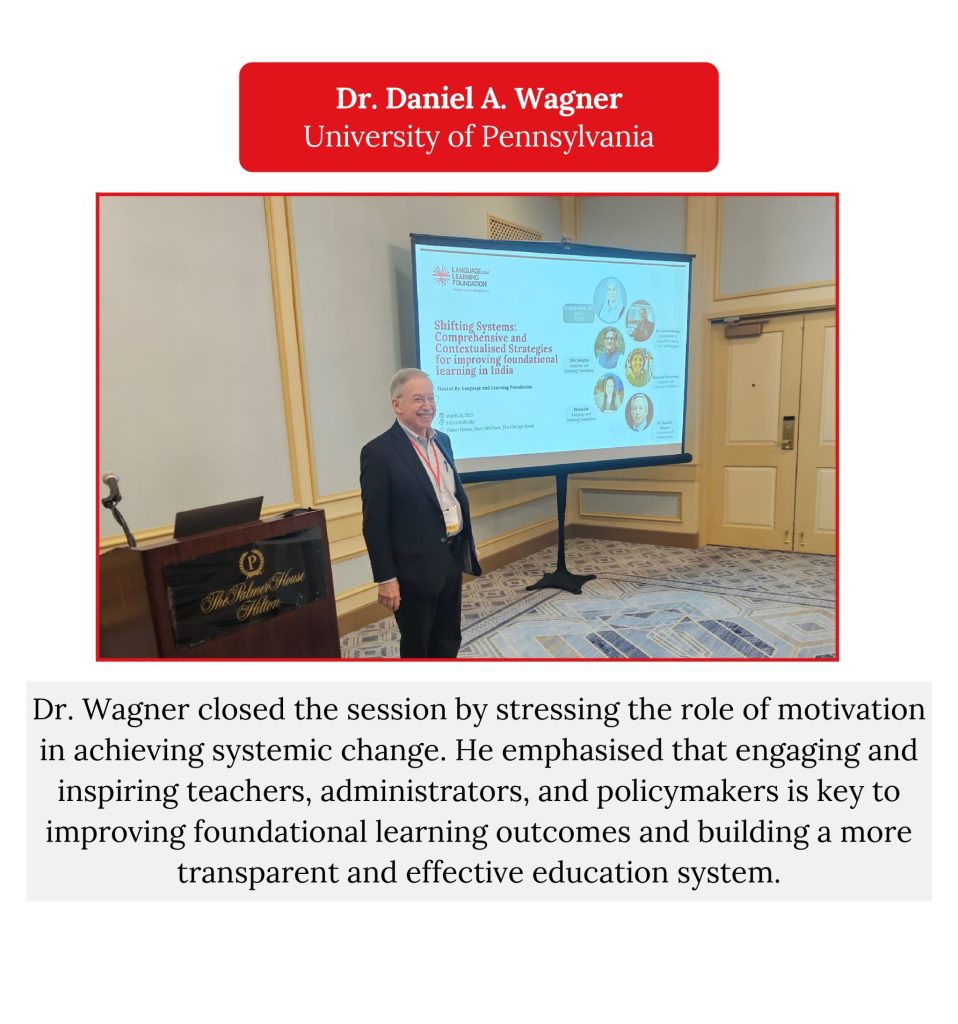
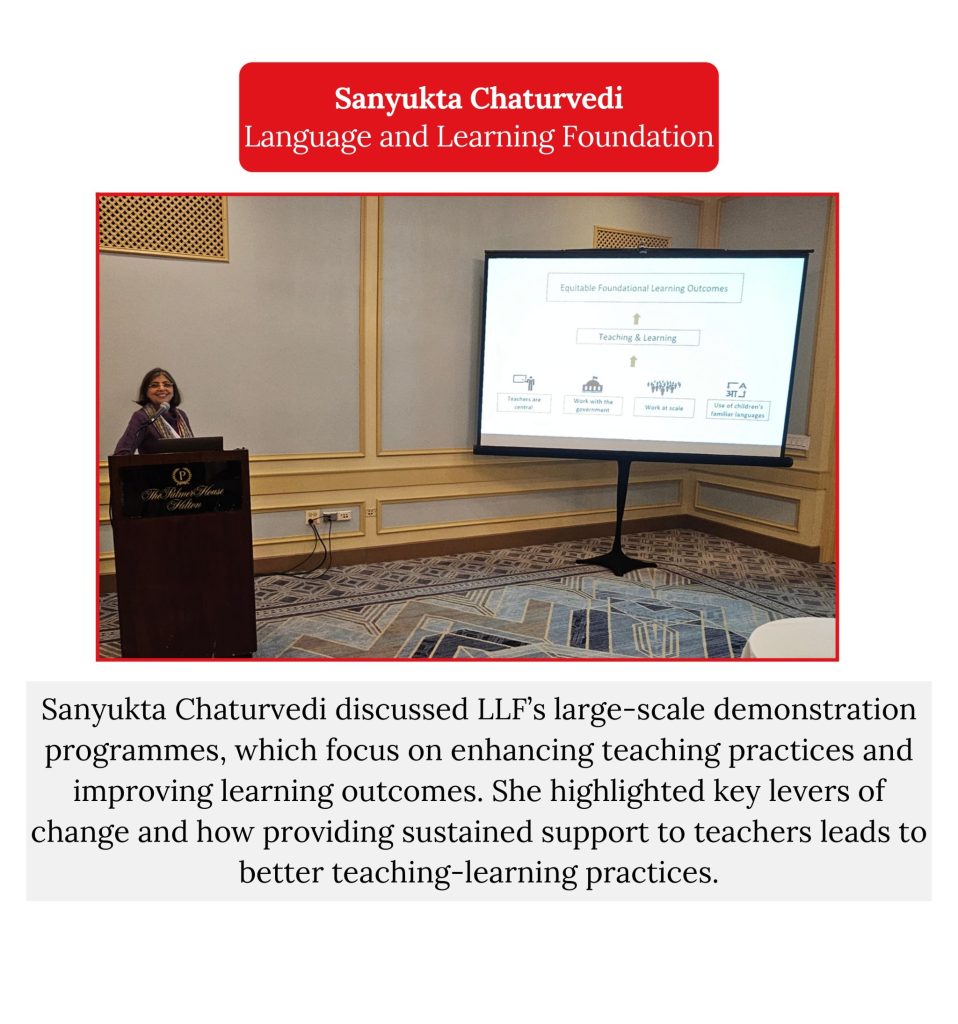
The discussion reinforced that contextualised, system-wide strategies are crucial for improving foundational learning at scale. By fostering collaboration, embedding multilingual approaches, and strengthening teacher support structures, India can drive sustainable improvements in FLN.
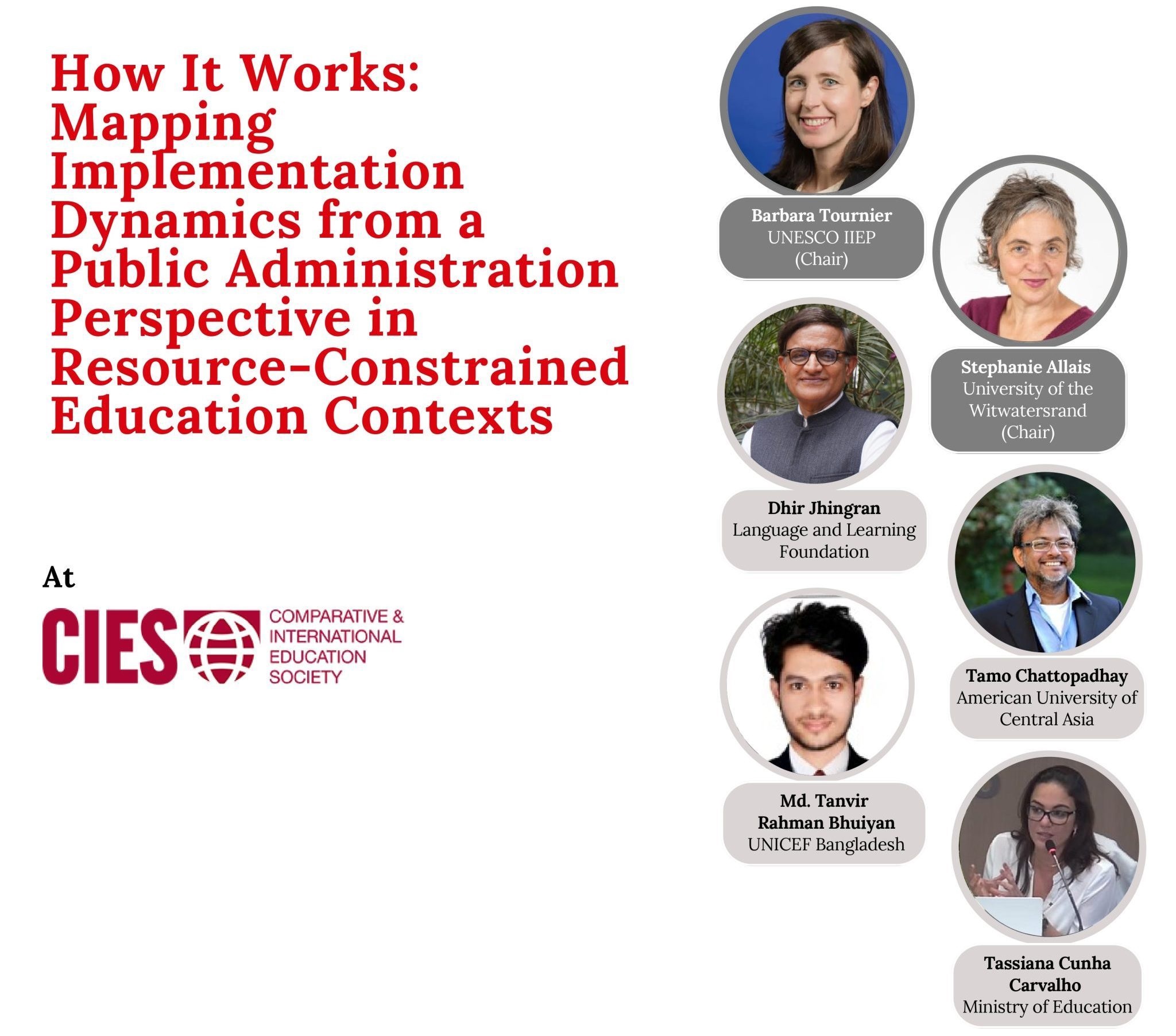
Education systems worldwide are dynamic and face implementation challenges. LLF contributed to a roundtable on Navigating Systemic Change in Education: Insights from Diverse Contexts. It was about large-scale education reform through government-nonprofit collaboration in India. This session applied a public administration lens to policy implementation across Latin America, Africa, and South Asia, exploring how context-driven, systemic approaches can drive real impact at scale.
Based on experience in eight Indian states, LLF shared key learnings on what works (and what doesn’t) in implementing high-quality FLN programmes.
Panelists:
– Barbara Tournier, International Institute for Educational Planning (IIEP-UNESCO) (Chair)
– Stephanie Allais, University of the Witwatersrand (Chair)
– Dhir Jhingran, Language and Learning Foundation (LLF), India
– Md. Tanvir Rahman Bhuiyan, UNICEF Bangladesh
– Tassiana Cunha Carvalho, Brazilian Federal Ministry of Education
– Tamo Chattopadhay, American University of Central Asia (AUCA)
LLF won the CIES South Asia SIG Best Field-based Initiative Award for our submission: ‘Multilingual Education in Chhattisgarh: Improving Foundational Learning Outcomes by Inclusion of Children’s Home Languages.’
This award recognises our efforts to promote equity, cultural inclusion, community partnerships, and sustainable project design in education.
In Bastar, Chhattisgarh, a tribal-dominated district where only 5% of children entering Grade 1 speak Hindi—the official medium of instruction in schools—LLF’s Multilingual Education (MLE) Programme has been bridging this linguistic gap since 2022. Starting with Halbi, the home language of nearly 50% of Grade 1 students, the programme has expanded to include Bhatri and Gondi, fostering a more inclusive learning experience.
More than just language, the Bastar MLE Programme integrates community knowledge and a culturally responsive curriculum, ensuring meaningful learning. Its success is driven by need-based teacher training, capacity building of teacher educators, and the deep field insights of our dedicated team.
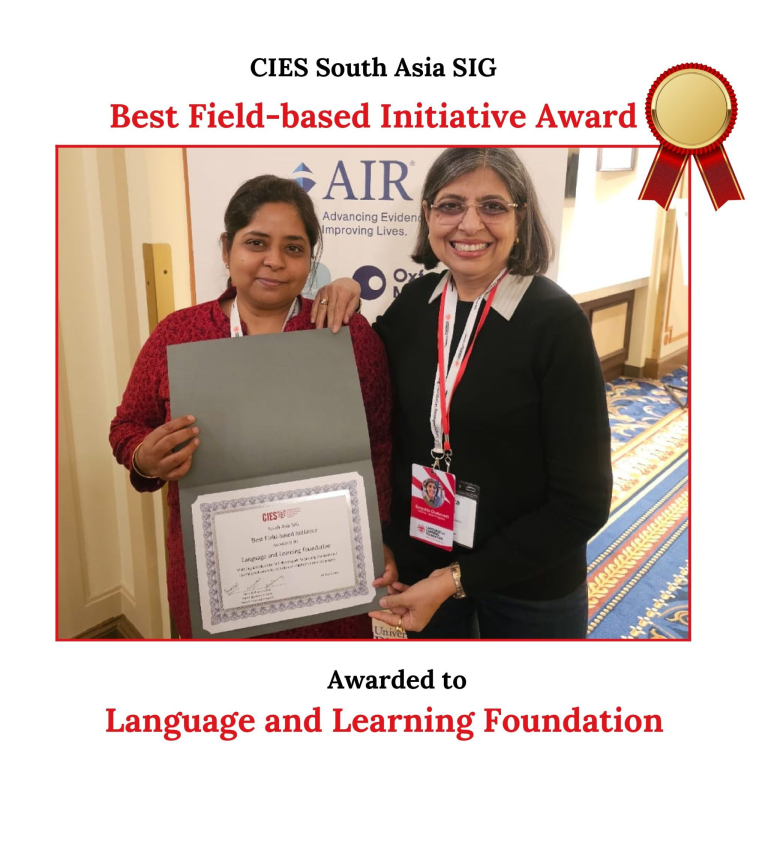
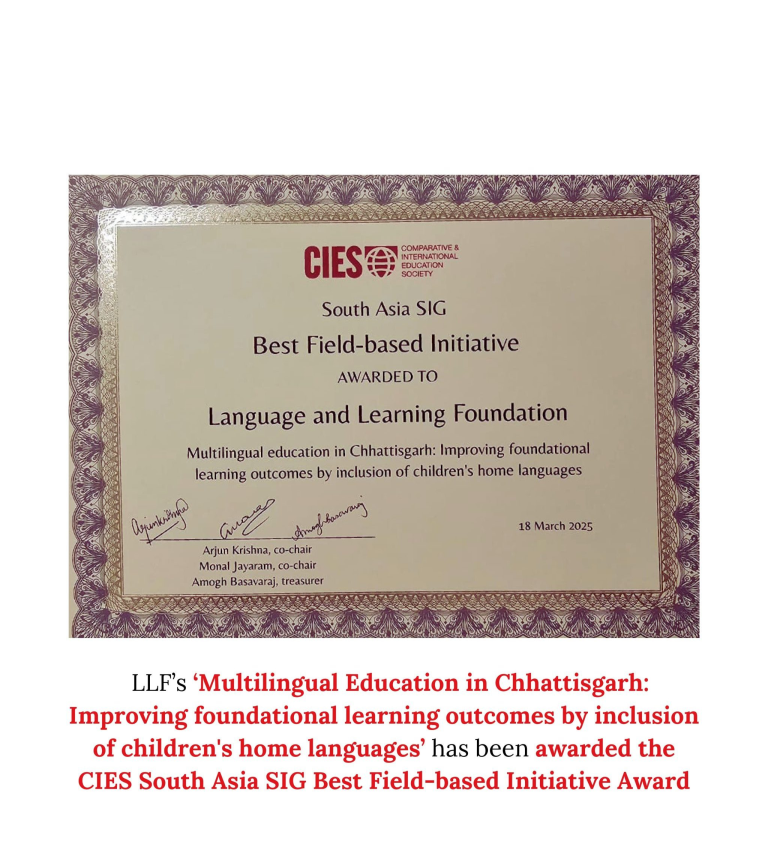
Launch of India's 1st National Teaching Learning Practices Survey (TLPS) for Foundational Literacy and Numeracy (FLN)

The 1st National Teaching Learning Practices Survey (TLPS) Report 2025 for foundational literacy and numeracy was successfully launched on 22nd December, at the India Habitat Centre, New Delhi, with the support of Tata Trusts.
The TLPS 2025 is India’s first large-scale, multi-state study that examines how teaching and learning take place inside early-grade classrooms. It goes beyond assessments to understand how teaching and learning of language and mathematics unfold in Grades 1 and 2, how teachers engage students, and how inclusive our classrooms are.
Anchored by LLF, supported by Tata Trusts, the survey was implemented in collaboration with leading FLN organisations, including Centre for microFinance, Educational Initiatives, Madhi Foundation, QUEST, and Vikramshila Education Resource Society, across 1,050 government primary classrooms in 21 districts spanning 9 Indian states: Assam, Chhattisgarh, Haryana, Jharkhand, Maharashtra, Meghalaya, Rajasthan, Tamil Nadu, and Uttar Pradesh.

The launch was graced by Shri Sanjay Kumar, IAS, Secretary, Department of School Education and Literacy, Ministry of Education, Government of India, as the chief guest, alongside esteemed guests, including Smt. Archana Sharma Awasthi, Joint Secretary (Samagra Shiksha – I and Adult Education), Ministry of Education, Government of India; Sh. Pandurang K Pole, Secretary (Higher Education), Government of NCT of Delhi, Dr Vivek Aggarwal, Director General, Elementary Education (DGEE), Haryana, Prof. Sridhar Srivastav, Dean (Coordination), NCERT, and Ms Amrita Patwardhan, Head, Education, Tata Trusts.
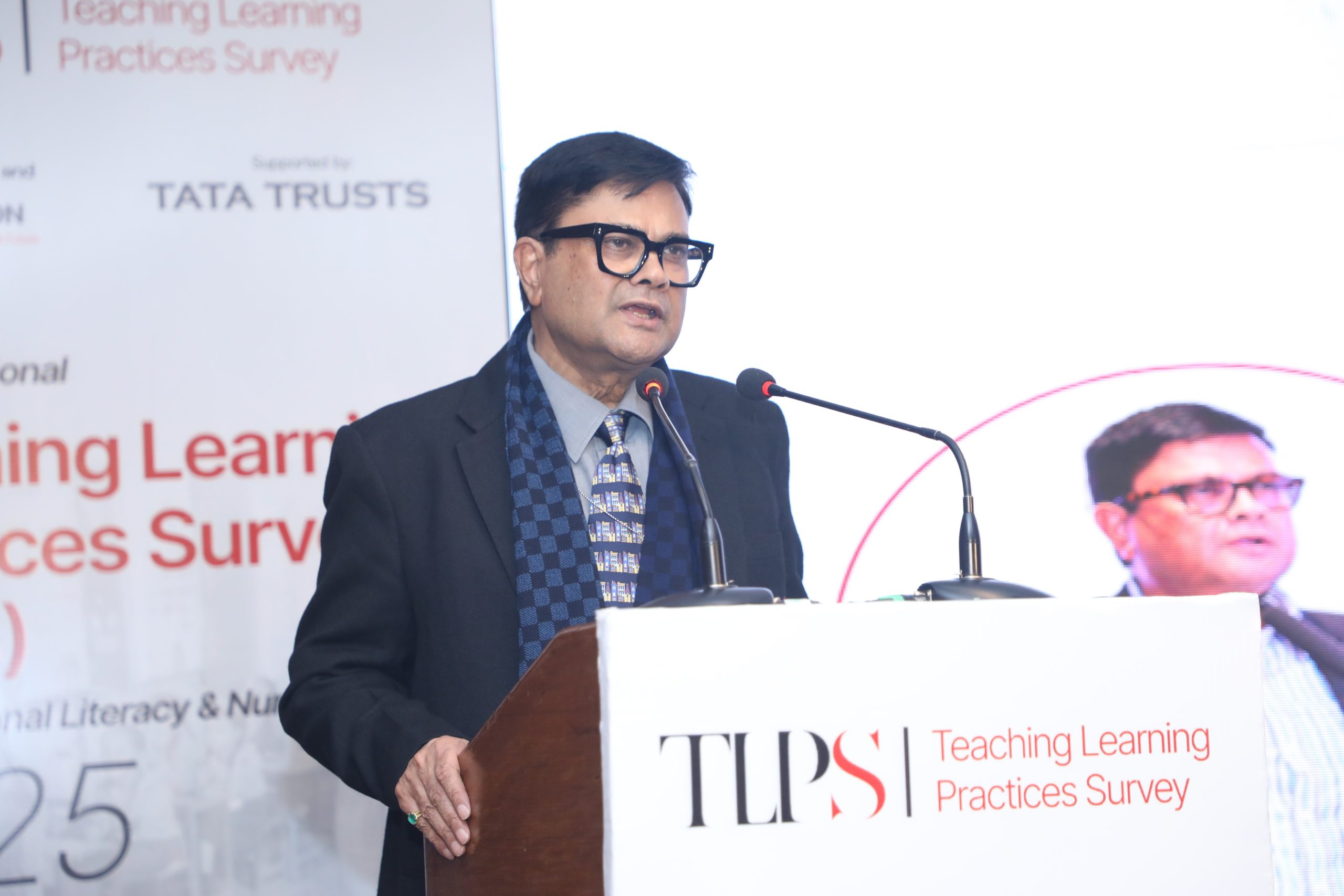
Shri Sanjay Kumar remarked, “I am happy to see the release of this study, the Teaching Learning Practices Survey (TLPS). The findings provide a strong evidence base. Given the scale of the sample, the insights emerging from this can be seen as reflective of teaching and learning practices across the country.”
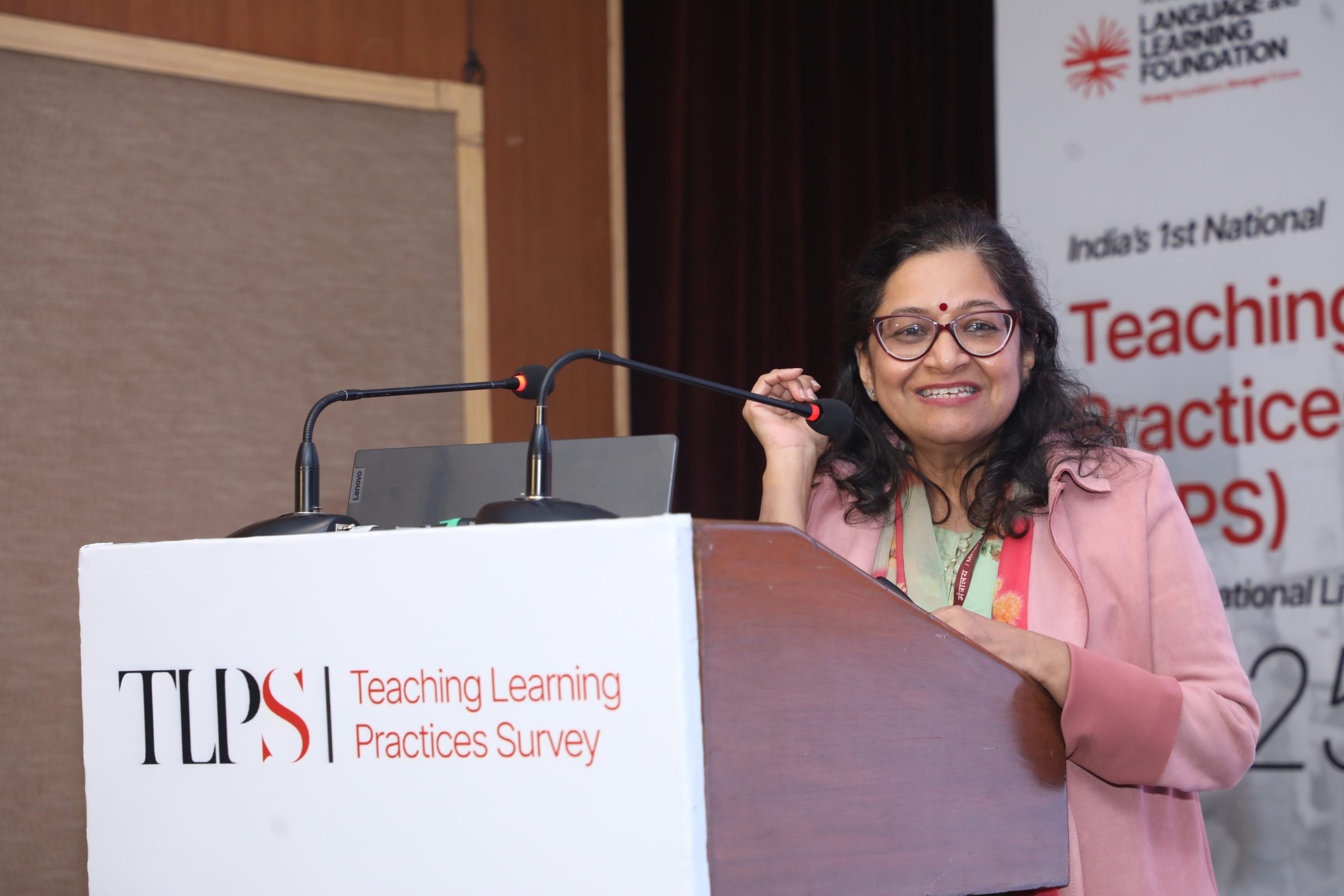
Smt Archana Awasthi highlighted how the NEP 2020 policy can be brought into action in classrooms through joyful and play-based learning and by using children’s most familiar languages for early learning.

The launch brought together representatives from the governments of TLPS partner states. It also saw dignitaries from apex education institutions such as the NCERT, SCERTs, state governments, academic institutions, funding organisations, civil society, and education practitioners.

The Expert Insights session on the TLPS 2025 report featured Dr Shailaja Menon, Consultant, Education Portfolio, Tata Trusts, and Ms Shubhra Chatterjee, Director, Vikramshila Education Resource Society, who reflected on the report’s implications for classroom practice and system reform.

The report received an overwhelming response and appreciation from all the dignitaries and attendees present at the event, speaking volumes about the collective need felt by the education sector in India for such a study.
10th Anniversary Celebrations

On February 27, 2025, with a landmark celebration at The Ashok in New Delhi, LLF celebrated a decade of pioneering work in strengthening Foundational Literacy and Numeracy (FLN) and Multilingual Education (MLE) across India. The celebration was graced with the presence of Chief guest, Shri Dharmendra Pradhan, Hon’ble Minister of Education, Guest of honour, Shri Sanjay Kumar, IAS, Secretary of the Department of School Education & Literacy, and Ms. Vrinda Sarup, Former Secretary of School Education, along with 200 dignitaries from the education sector including partner organisations from corporates and philanthropies.
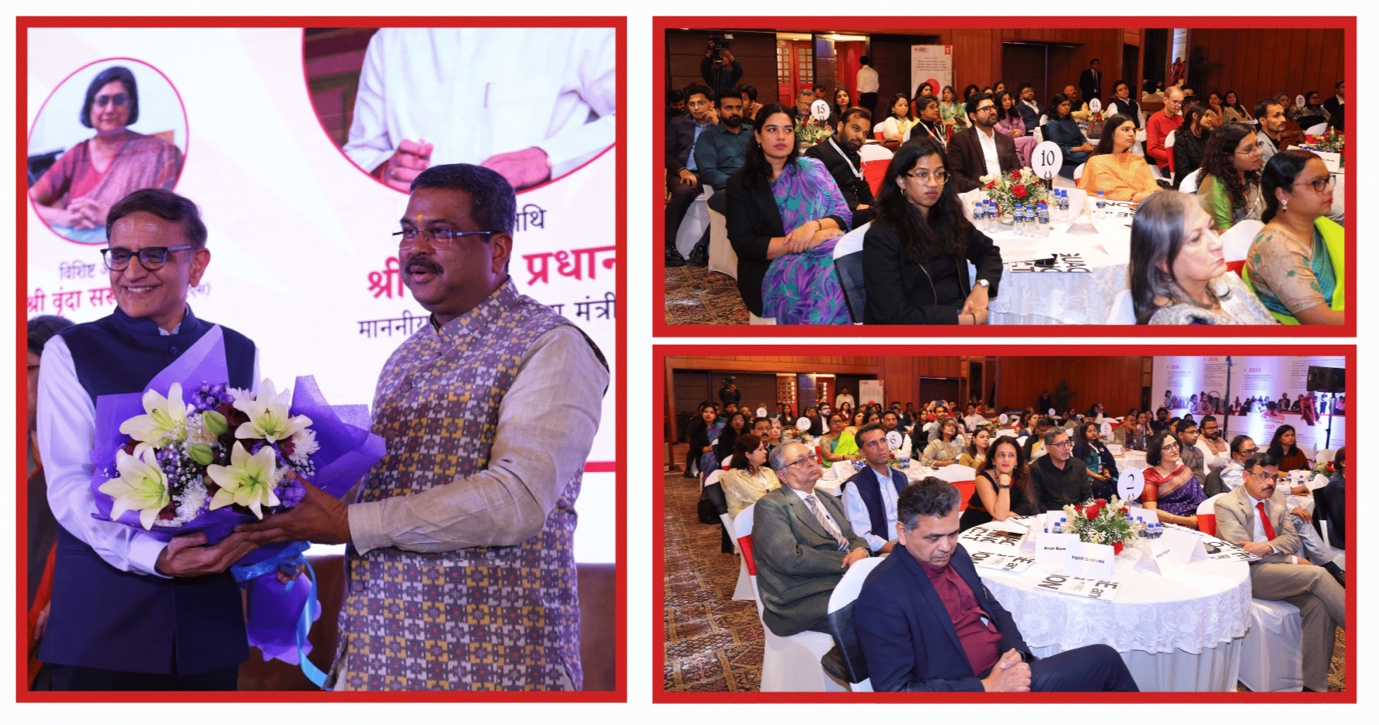
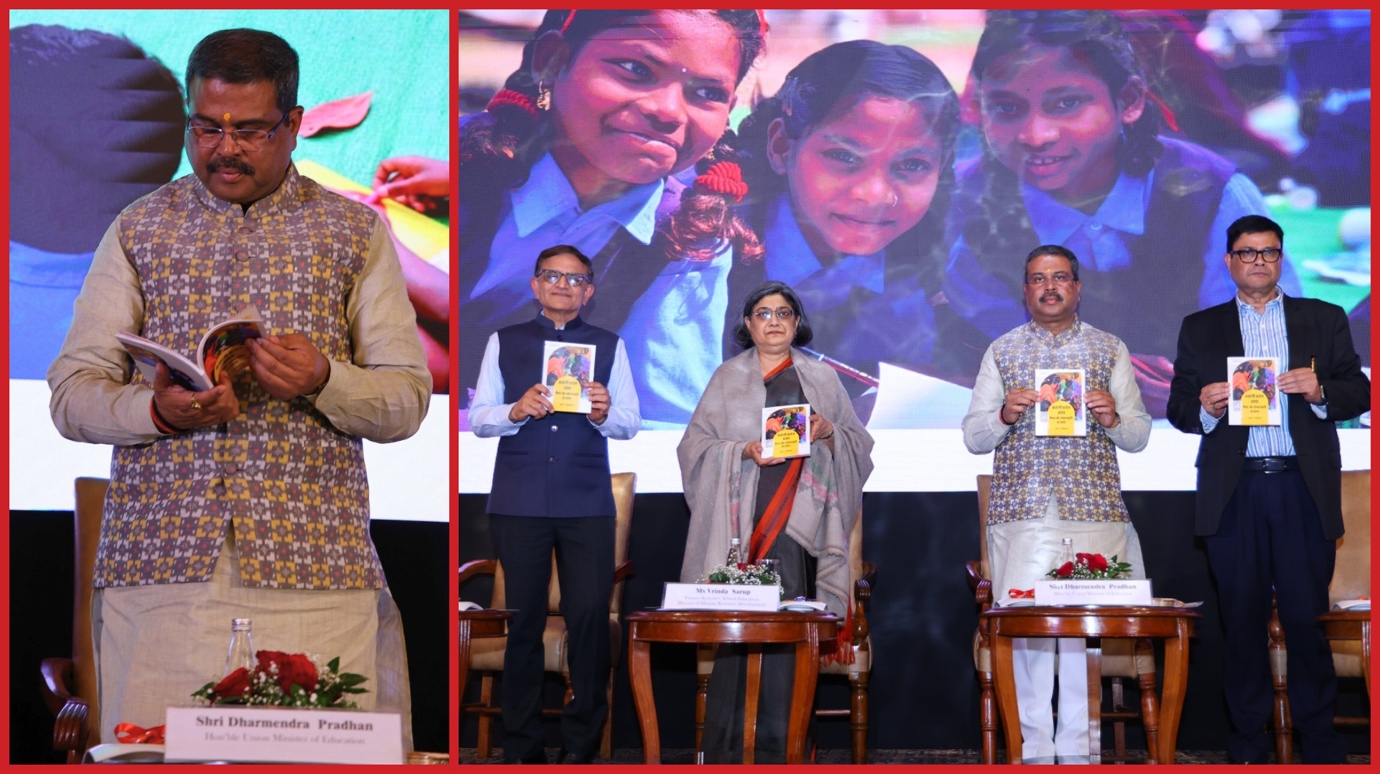
Our 10th anniversary celebration marked a significant achievement in our journey with the launch of several educational initiatives by Hon’ble Education Minister, Shri Dharmendra Pradhan:
- Bilingual Textbooks: Specially developed by LLF in Halbi and Hindi languages for Grades 1 and 2, empowering children to learn in their mother tongue while building regional language skills.
- Storytelling Festival Document: “कहानीकथनउत्सव -िशक्षाऔरलोकसंस्कृितकासंगम” – a unique resource supporting multilingual education in Bastar, Chhattisgarh, that celebrates the beautiful intersection of education and local culture.
- Public Goods Platform: Our new digital resource hub designed to strengthen the FLN ecosystem across India.
LEADERS SPEAK

“India’s multilingualism is our greatest strength—enshrined in our Constitution and championed by Prime Minister Narendra Modi ji—fueling a unity that propels our progress. Under the transformative NEP 2020 and NIPUN Bharat mission, the government is dedicated to ensure that all children master foundational literacy and numeracy skills using a multilingual approach. Just as everyone came together to fight for India’s independence, we all will have to unite and work together for foundational literacy and numeracy .”
— Shri Dharmendra Pradhan, Union Minister of Education of India

“As Language Learning Foundation completes a transformative decade, we reaffirm the NEP 2020’s vision: language is the cornerstone of cognition, creativity, and cultural identity. With India’s linguistic diversity spanning 121 languages being spoken by more than 10,000 people, a multilingual teaching approach is imperative for achieving the NIPUN Bharat goal.”
— Shri Sanjay Kumar, IAS, Secretary, Department of School Education & Literacy, Ministry of Education

“The dedication of LLF, under the leadership of Mr. Dhir Jhingran, is truly commendable. Their outcome-driven approach ensures no compromise on process while maintaining a sharp focus on measurable impact. Their work in multilingual education is particularly significant in enabling children to transition smoothly to the medium of instruction.”
— Ms. Vrinda Sarup, Former Secretary, School Education, Ministry of Human Resource Development
EMPLOYEE RETREAT: CELEBRATING, REFLECTING, RECONNECTING
On 25-26 February 2025, we saw the coming together of 300 team members from 8 states under one roof for the first time. It was a moment to pause, reflect, and reconnect—strengthening the bonds that drive our collective mission in foundational learning.
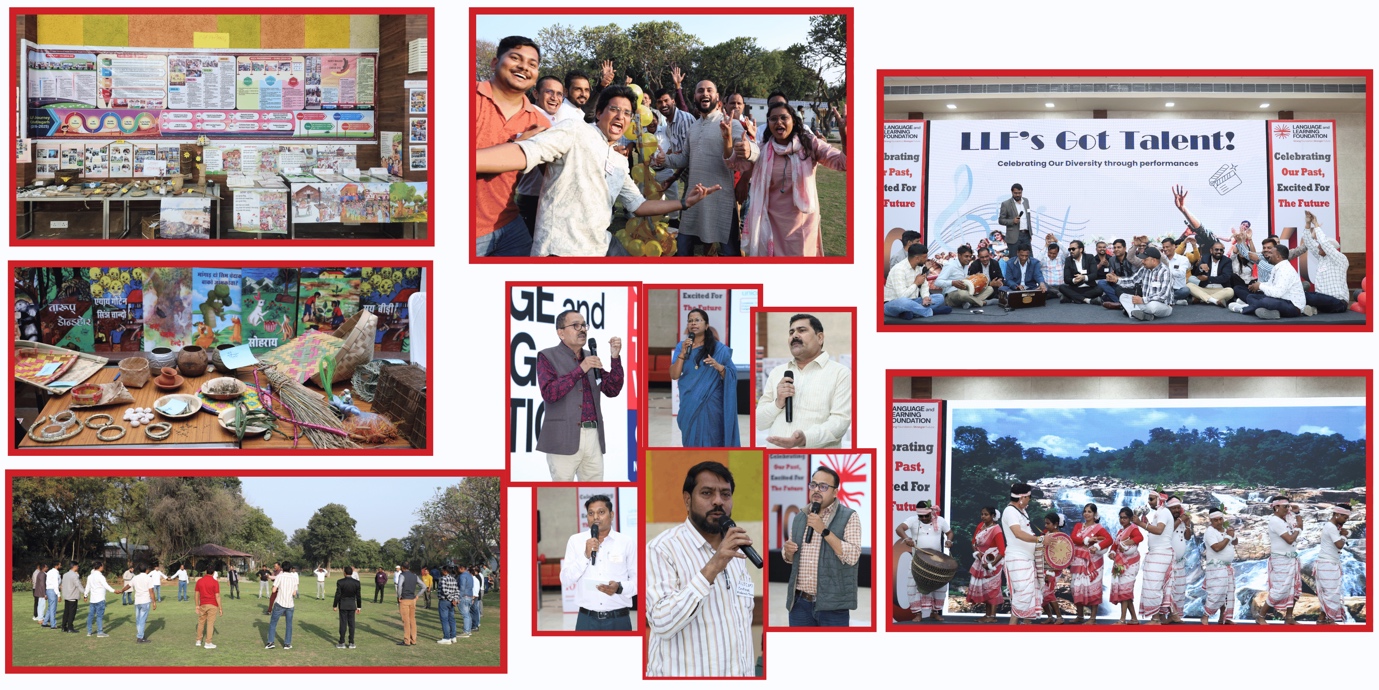
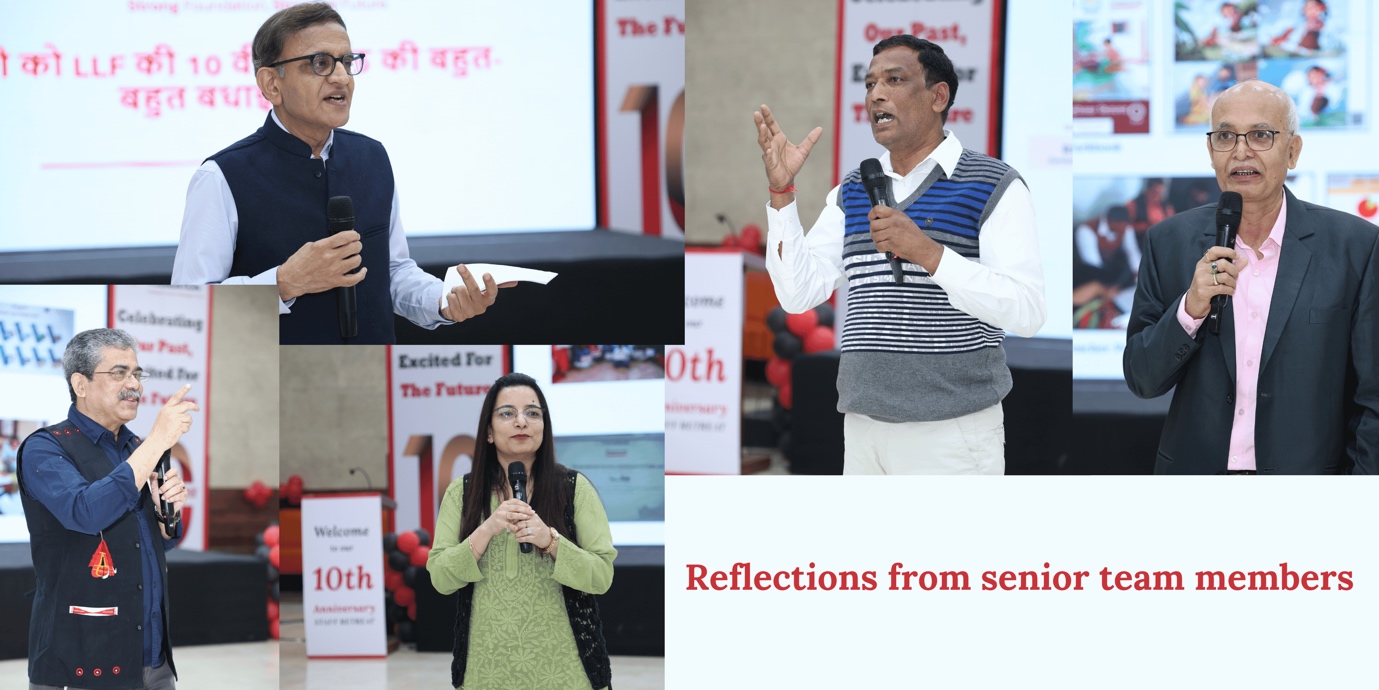

As we move ahead on this journey, we carry this renewed energy forward—united in our vision of a Strong Foundation, Stronger Future for every child.
2030 MISSION
Donation will be eligible for exemption under section 80G of the Income Tax Act, 1961
